

























Why SA’s payment revolution hinges on trust, technology and inclusion





















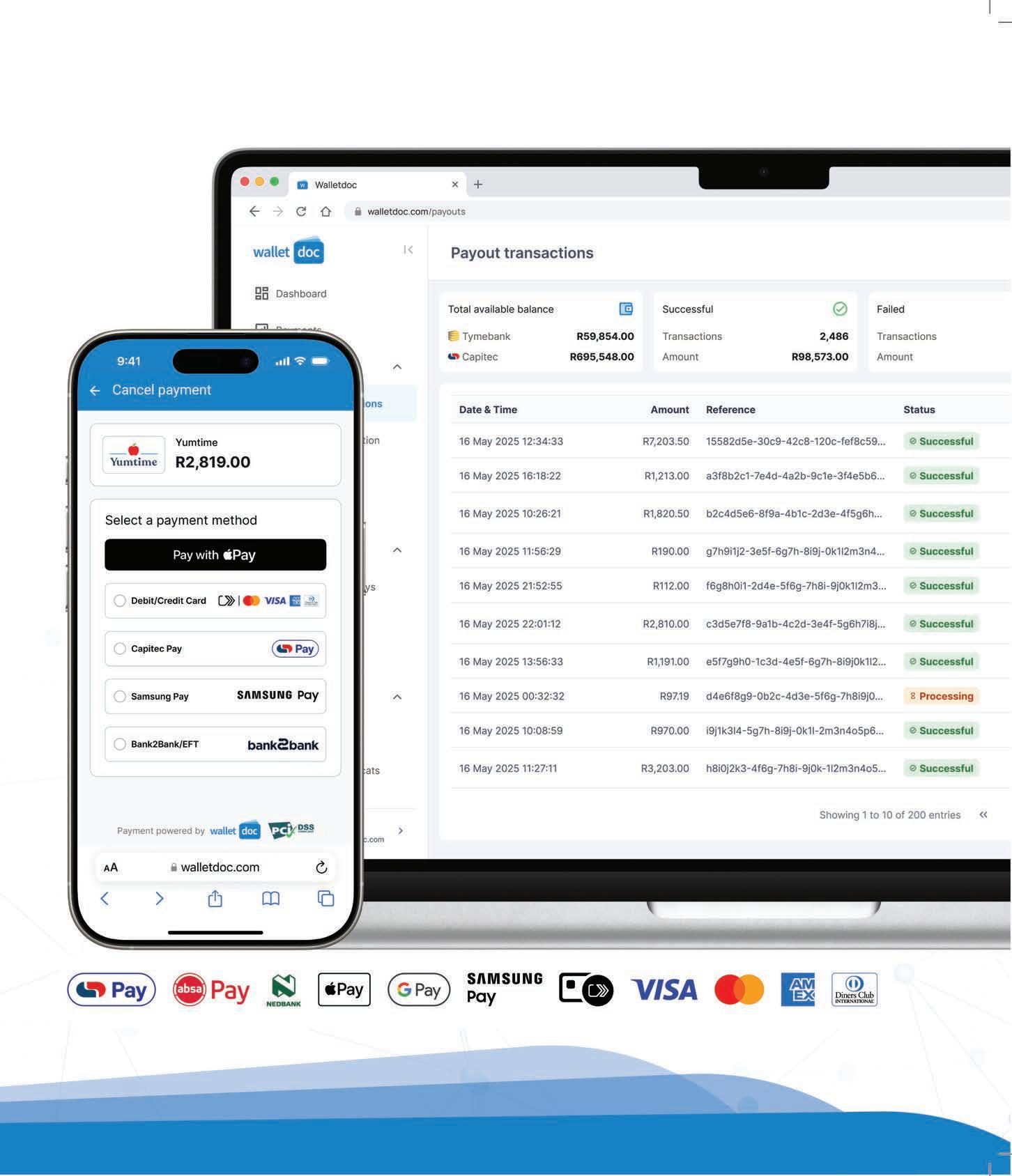
Altron FinTech is a proudly South African company that has been innovating payment solutions for over 30 years. We’ve pioneered solutions that simplify payment challenges and make it easier for you to do business because it’s our business to support and grow yours.
Our purpose is simple: to help our customers get paid, grow their operations and serve their communities. We offer a wide range of services, from debit order processing and transaction switching to credit management tools, card personalisation and payment solutions like NuCard and iMali. Whether you run a school, are a microfinancier, a retail store or a medical practice, we’ve designed our technology to meet your needs and remove the technological, regulatory and processing complexities that get in your way.
Our people are dedicated to service and innovation, working behind the scenes to keep your business moving. We also partner with leading hardware providers, so you get top-tier, reliable payment devices.
We’ve seen how the right technology can change lives. That’s why we stand by our promise: our technology impacts lives, with our people behind it. We’re here to help you grow into tomorrow with smarter tools, trusted service and solutions that work because you matter.
For more information:
010 060 4444
www.altronfintech.com www.linkedin.com/company/altronfintech


Investec partners with private, institutional and corporate clients, offering international banking, investment and wealth management services in two principal markets, South Africa and the United Kingdom, as well as certain other countries. The group was established in 1974 and currently has approximately 7 800-plus employees. Investec has a dual-listed company structure with primary listings on the London and Johannesburg Stock Exchanges.
Visa is a world leader in digital payments, facilitating transactions between consumers, merchants, financial institutions and government entities across more than 200 countries and territories. Our mission is to connect the world through the most innovative, reliable and secure payment network, enabling individuals, businesses and economies to thrive.
Visa is pioneering this next chapter, and South Africa is uniquely positioned to lead in adoption. According to Visa’s Consumer Empowerment Study, 62 per cent of South African consumers trust that their data is being handled securely. Yet, 38 per cent seek greater control over how their data is used. Agentic commerce directly addresses this need by enabling consumers to set clear parameters around how, where and when their credentials are used – placing control firmly in their hands.
South Africa’s digital maturity further strengthens its readiness. Financial institutions are already deploying advanced technologies such as tokenisation and mobile-first authentication. Biometric verification is becoming commonplace, and digital wallets are gaining traction. These developments create a robust foundation for the seamless integration of agentic commerce.
For more information: https://www.visa.co.za/

We make getting paid easy
Walletdoc is a proudly South African fintech transforming how businesses accept payments, online, in-app and in-store. Trusted nationwide, Walletdoc processes billions of rands annually. Our PCI Level 1 and PCI 3DS certification guarantees world-class transaction security.
We offer a complete suite of payment options, from card machines and e-commerce payments to mobile wallets such as Apple Pay, Google Pay, Samsung Pay and Click2Pay. Our solutions are designed for speed and simplicity, reducing payment friction and lowering cart abandonment.
Walletdoc leads with innovation, offering real-time transaction visibility, automated reconciliation and seamless integrations. Our mobile app and web portal give merchants instant access to data, making business management effortless.
With 24/7 local support, Walletdoc is more than a service provider; we are a partner in your success. Choose Walletdoc for secure, scalable, and user-friendly payment solutions that empower your business to thrive.
get started. sales@walletdoc.com | www.walletdoc.com


6 SUSTAINABILITY
Payment systems have a major impact on environmental, social and governance considerations across industries.
14 COMPLIANCE
As African fintech start-ups navigate the continent’s complex regulatory maze, compliance-as-a-service is becoming the backbone of their expansion.
20 DIGITAL PAYMENTS
Digital payment is no longer a peripheral convenience, this technology is now central to the transformation of payment ecosystems worldwide.
24 CONTACTLESS PAYMENTS
Initially driven by COVID-19 requirements, the implementation of contactless banking technology has now reached a stage of widespread acceptance.
29 FRICTION
Reducing friction in digital payments is key to enabling seamless commerce across Africa.
30 SUPER APPS
Integrating a growing array of services into one convenient, mobile-friendly package, super apps are winning over consumers.
34 CRYPTOCURRENCY
Shifts in how we interact with money, along with technology, are prompting a rethink of wealth from the ground up.
35 AFRICAN TRADE
The Pan-African Payment and Settlement System represents a game-changer for intra-African trade.
36 OFFLINE PAYMENTS
To ensure financial inclusion for all, South African businesses and consumers must fully embrace offline payment solutions.
42 INSTANT PAYMENTS
Demand for instant payments is driving a major rethink of South Africa’s digital payments landscape.
RMB is a leading African Corporate and Investment Bank (CIB). We partner with our clients to deliver advisory, lending, trading, securities, corporate banking, private equity and investment solutions. A presence in London, New York, Shanghai and Mumbai provides our global clients with a network to access African markets. We have a deal footprint in 35 African countries and facilitate cross-border trade and investment on the continent. RMB represents the CIB activities of FirstRand Limited – one of the largest financial services groups in Africa.
Founded in 1977 by three entrepreneurs, our business has always attracted a diverse group of talented people with an inherent curiosity and natural ability to harness different perspectives to tackle complex problems, creating solutions with lasting impact.
As an employer of choice, our unique and empowering culture is one that embraces human connection, inspiration and excellence to solve challenges and unlock opportunities for our clients and society.
RMB is made of Africa – our commitment to our clients, our continent and our people is evident in our successful track record. We create new opportunities where others see challenges.
For more information, visit: www.rmb.co.za



46 ECOSYSTEMS
In a move aimed at transforming the local payments landscape, eight nonbank fintech entities have formed the Association of South African Payment Providers.
52 FINTECH TRENDS
South Africa’s payments ecosystem has been evolving rapidly with significant growth over the past few years and open banking continuing to take centre stage.
54 GIG ECONOMY
As the gig economy booms, organisations need to cut red tape and speed up payment processes to match the speed at which their suppliers deliver.
56 EARNED WAGE ACCESS
What does allowing workers to access a portion of their earned income before payday mean for spending habits, financial inclusion and savings?
58 TRANSACTION SWITCHING
The power of transaction switching is revolutionising payment ecosystems.


South Africa is at a pivotal point in the evolution of its payments landscape.
We pioneered real-time clearing in 2006, have a strong, regulated banking system and a growing ntech ecosystem tackling local and global transaction challenges.
Yet, we’ve fallen behind. The South African Reserve Bank estimates that 55 per cent of transactions still use cash, likely excluding the informal economy. This is due to poverty, low-value transactions, mistrust in the system, lack of convenience and affordability issues.
Progress is underway. The launch of PayShap, enabling real-time, low-value interbank payments, aims to reduce cash reliance and improve convenience. In this issue of Payments, we explore how this
shift is reshaping the digital payments space for businesses and consumers.
We also examine ways to reduce friction in the ecosystem, the role of Bitcoin in nancial inclusion and the ESG impact of payments innovation.
Looking continentwide, the Pan-African Payment and Settlement System is tackling the long-standing issues of high costs and currency complexities in cross-border trade, vital for economic resilience.
Other developments include innovations in of ine payments to address limited internet access, improvements in contactless experiences, faster payments for gig workers and earned wage access systems supporting lower-income earners and promoting nancial literacy.
Customer experience is central, especially with the rise of super apps, hugely successful in Asia and gaining traction here. Much of this progress is driven by ntechs. We pro le three standout players in this issue, proof that while challenges remain, meaningful progress is being made.
Samsung South Africa is a subsidiary of the global electronics giant Samsung Electronics, which manufactures and redefines the world of electronic devices, including smartphones, wearables, tablets, TVs, monitors, home appliances, semiconductors and more. The company has been championing and embracing the transformative power of artificial intelligence, which is now quickly becoming integrated into everyone’s daily lives. Its purpose is simple: to give local consumers the freedom to take journeys, to discover new experiences and take charge of the world – providing them with a new way of life.
Since the dawn of democracy when Samsung entered the African continent with the establishment of the South African office, it has been committed to pushing its transformation agenda by investing in a number of empowerment programmes for the future, which have now led to positive social changes across the broader African continent. Samsung remains committed to contributing to a sustainable environment, both locally and globally.
For more information: www.samsung.co/za

Anthony Sharpe, Editor







SARB’S PAYMENTS STUDY REPORT 2023
Business Day
Picasso Headline, A proud division of Arena Holdings (Pty) Ltd, Hill on Empire, 16 Empire Road (cnr Hillside Road), Parktown, Johannesburg, 2193 PO Box 12500, Mill Street, Cape Town, 8010 www.businessmediamags.co.za
EDITORIAL
Editor: Anthony Sharpe
Content Manager: Raina Julies rainaj@picasso.co.za
Contributors: Keith Bain, Ben Caselin, Trevor Crighton, Megan Ellis, Rufaida Hamilton, David King, Dr Joseph Upile Matola, Lineshree Moodley, Busani Moyo, Brendon Petersen, Charl Janse van Rensburg, Rodney Weidemann, Lisa Witepski
Copy Editor: Brenda Bryden
Content Co-ordinator: Natasha Maneveldt
Online Editor: Stacey Visser vissers@businessmediamags.co.za
DESIGN
Head of Design: Jayne Macé-Ferguson
Senior Designer: Mfundo Archie Ndzo
Cover Image: [faithie]/123rf.com
SALES
Project Manager: Tarin-Lee Watts wattst@arena.africa | +27 87 379 7119 +27 79 504 7729
PRODUCTION
Production Editor: Shamiela Brenner
Advertising Co-ordinator: Johan Labuschagne
Subscriptions and Distribution: Fatima Dramat, fatimad@picasso.co.za
Printing: CTP Printers, Cape Town
MANAGEMENT
Management Accountant: Deidre Musha
Business Manager: Lodewyk van der Walt
General Manager, Magazines: Jocelyne Bayer
COPYRIGHT: No portion of this magazine may be reproduced in any form without written consent of the publisher. The publisher is not responsible for unsolicited material. Payments is published by Picasso Headline. The opinions expressed are not necessarily those of Picasso Headline. All advertisements/advertorials have been paid for
2025/06/20 10:47





in partnerships with our clients.

Industries worldwide are hastening to embrace environmental, social and governance principles as much to attract and retain clients as to fulfil their responsibilities in terms of society and the environment. How do payment providers measure up? By LISA
WITEPSKI
In South Africa, it is the inclusion – or social – element within the environmental, social and governance (ESG) framework that is garnering the most attention currently. This is an area where the payments industry stands to make a signi cant impact, says Tijsbert Creemers-Chaturvedi , managing director and senior partner at Boston Consulting Group (BCG) Johannesburg.
“The payment industry is pivotal in advancing nancial inclusion by facilitating individuals’ participation in the formal economy and promoting economic ow,” says Creemers-Chaturvedi. “Digital payments not only offer a safer alternative to cash, but also generate a data footprint that enables users to qualify for a broader range of nancial products and services, such as credit.”
Creemers-Chaturvedi adds that there are three distinct levels to nancial inclusion, starting with access to nancial products, then utilisation of the product and broader adoption, where multiple nancial products, such as credit and life insurance,

which means we have played a key role in driving nancial inclusion, especially for
There have been notable innovations
providers across the continent. M-PESA and MoMo are cases in point, and these payment solutions have served as
Mastercard is also cash to digital payments: “We work closely with banks, telcos and
ntechs to broaden access to digital nancial services,” explains Mark Elliott, president for Africa at Mastercard. The company’s collaboration with MTN Group Fintech has connected millions of previously unbanked individuals to the digital economy.
However, signi cant barriers to the adoption of digital payment solutions remain. Chief among these, according to Creemers-Chaturvedi, is the development of use cases that would promote further adoption and enhance nancial inclusion (still under development), while the paperwork associated with formal payment systems is frequently cumbersome.
In the UK, 11.2 billion unrecyclable paper receipts are printed annually.
Source: The Payments Association
and data packages are not accessible to all would-be users. Finally, many South Africans, especially the unbanked or underbanked, remain reliant on cash.

Kitso Lemo, associate director of BCG Johannesburg, notes that the costs associated with banking and payments in South Africa are often prohibitively high. This serves as a signi cant barrier to nancial inclusion, along with other factors such as trust issues. “There is often a lack of trust in digital nancial services, stemming from concerns related to fraud, cybercrime and data privacy.”

Credit scoring is an additional problem, while the digital divide means that smartphones
These problems are not insurmountable, Lemo insists. Access to affordable smartphones and data packages is a start because this would lay the foundation for engagement with digital payment services.
“One approach is to offer free or low-cost services to onboard users to digital payment platforms. For instance, telco providers’ mobile money services often have no fees for deposits, although they may impose charges for transactions and withdrawals. Additionally, payment processors such as Yoco are developing low-cost transaction models and subscription packages that are accessible for small, medium and micro enterprises (SMMEs) and local businesses, enabling them to accept payments from cashless customers.
“Another approach is to develop comprehensive ecosystems, not merely applications,” Lemo says. “Centred around a core service, providers, for example, Tymebank and Mukuru, offer a suite of services such as payments, remittances, savings and lending. This approach drives nancial inclusion by providing accessible and comprehensive nancial solutions to underserved communities.”
THE DIGITAL DIVIDE MEANS THAT SMARTPHONES AND DATA PACKAGES ARE NOT ACCESSIBLE TO ALL WOULD-BE USERS. FINALLY, MANY SOUTH AFRICANS,
IS WORKING WITH PARTNERS TO INTRODUCE SUSTAINABLE CARDS, REDUCING RELIANCE ON FIRST-USE PVC AND INSTEAD USING RECYCLED OR BIODEGRADABLE MATERIALS.
Pumpkn.io is another company aiming to foster greater nancial inclusion. This digital lender targets the agri-food economy, historically overlooked by the traditional banking sector, which tends to focus more on small retailers and urban-based SMMEs.
“We understand that the largest barrier for agri-food entities is the fact that they lack the banking history that is usually required before a nancial institution will grant a loan,” says Jérôme van Innis, Pumpkin.io co-founder. The company turns this model on its head by making funding available within 24–72 hours; thereafter, the SMME can generate records that build its pro le and make it eligible for further funding.
Elliot says; however, they are also able to offset this footprint through a contribution to the Mastercard Priceless Planet Coalition, which funds reforestation.
Mastercard is working with partners to introduce sustainable cards, reducing reliance on rst-use PVC and instead using recycled or biodegradable materials. Since its inception in 2018, more than 750 nancial institutions in 100 countries have issued cards through the Sustainable Cards programme.

Funding doesn’t only facilitate inclusion, however. Van Innis observes that this is often merely the rst rung on a ladder; once a small business is thriving, it is able to explore avenues that would ultimately lead to greater climate resilience, such as funding new techniques for keeping produce fresh through climate-friendly refrigeration. “Sustainability is certainly a consideration for our clients as they are severely affected by weather events,” he points out. “Our solution aims to build their resilience.”
Companies are also turning their attention to reducing their environmental footprint. Mastercard has several initiatives underway in this regard, says Elliott. The company has introduced the Mastercard Carbon Calculator, allowing cardholders to measure their carbon footprint based on their spending. “This is intended to help them make better choices,”
As ESG gains greater prominence on the industry’s agenda, it is likely that more companies will nd ways to enhance their sustainability credentials and, by extension, those of their clients.
The Payments Association suggests the following steps as a foundation for environmental, social and governance (ESG) in any business:
• Transparency is key. Customers need to know why you are striving for greater sustainability. This includes revealing facts about your current environmental footprint.
• Make sustainable payment methods – such as digital currency, mobile wallets or electronic payments – part of your offering.
• Work with suppliers that support and amplify your ESG goals.
• Incorporate any customer feedback pertaining to your efforts. This will ensure that they add real value.
Follow: Mark Elliott @ www.linkedin.com/in/mark-elliott-bbb63826
Tijsbert Creemers-Chaturvedi @ www.linkedin.com/in/tijsbert-creemers-chaturvedi-701520
Kitso Lemo @ www.linkedin.com/in/kitso-lemo
Jérôme van Innis @ www.linkedin.com/in/jerome-van-innis
The amount of plastic used to produce banking cards every year weighs as much as 95 Boeing 747s.
Source: Thales Group
Nonetheless, the Payments Association (which operates in the United Kingdom, European Union and Asia), observes that several obstacles must be addressed before this becomes widespread practice. These range from consumers’ wariness around greenwashing to the reality that consumers are unlikely to adopt green measures if they lead to greater costs. Consumers also demand that, more than an image-building exercise for a company, these measures must provide real value. On the other side of the spectrum, there are many consumers who have not considered that a payments solution could – or even should – take environmental considerations into account. The task here is to generate awareness of why this is important.
“One of the key challenges is identifying the right partners to co-design, scale and deliver solutions that not only serve commercial needs, but also support sustainability goals. Integrating environmental and social responsibility into product design and usage requires alignment across the ecosystem, from issuers and acquirers to merchants and consumers,” concludes Elliott.
“INTEGRATING
ECOSYSTEM.”
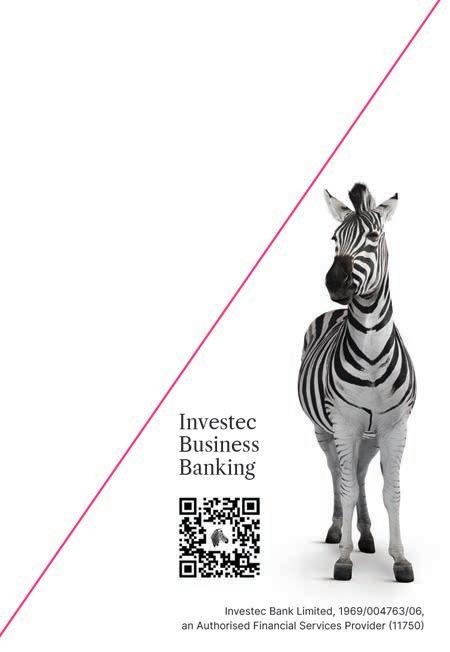



Powering South Africa’s real-time economy requires us to rethink the broader payments ecosystem, write KUBEN NAIDOO , head of corporate payments at Investec South Africa, and THIVIAN MOODLEY , head of product and pricing for Investec transactional products and solutions at Investec Bank
In the era of the real-time economy, payments must be instant, always available, secure and cost-effective. However, today’s expectations go far beyond reliable swipes and infrastructure. Consumers and businesses alike now demand personalised experiences, along with payment solutions that integrate effortlessly into everyday life and operations. This shift is driving a fundamental transformation in the payments landscape and how nancial services providers are using technology to innovate with purpose. No longer just a background utility, payments have become a catalyst for innovation, nancial inclusion and economic resilience. In South Africa, as around the world, real-time, digital- rst payment systems are not simply technological
upgrades; they represent a complete reimagining of how value moves through the economy.
Real-time payment systems are rapidly becoming the new standard globally. The rise of platforms like India’s UPI, Brazil’s Pix and Nigeria’s NIBSS Instant Payments has demonstrated the economic bene ts of enabling immediate, secure and costef cient transactions. In India alone, the digital economy contributed 11.74 per cent to gross domestic product in 2022–2023.
South Africa, once a global pioneer in payment innovation, having launched real-time clearing in 2006, now nds itself playing catch-up. It is estimated that over 55 per cent of South African transactions,
Investec’s strategy is built on two core pillars. Firstly, we are investing in advanced transactional platforms to serve mid-sized corporates across South Africa. Our focus is to enable these businesses to operate in a real-time environment, integrate with modern payment rails like PayShap and scale with confidence. Secondly, we are working closely with fintechs, retailers and mobile operators to deliver embedded solutions. Whether powering the back end of a national retailer’s consumer-facing applications or enabling seamless payouts for a growing fintech, our technologyforward approach ensures we adapt to our partners’ needs. Our payments team is not just modernising payment systems; they are co-creating new ones in collaboration with ecosystem players and deeply invested in bringing banking into businesses.

by volume, still happen in cash (and this is likely higher in the informal economy), despite widespread access to banking. However, this reliance on cash is not due to lack of access, but rather a result of gaps in convenience, trust and affordability, which digital platforms are only now beginning to solve.
The South African Reserve Bank’s (SARB) Payment Ecosystem Modernisation initiative, and particularly the launch of the Rapid Payment Programme and PayShap, have signalled a fundamental reset. PayShap is the rst mandatory, 24/7 payment scheme in South Africa. Unlike legacy EFT systems, it enables real-time, cost-effective transactions and is as easy to use for a merchant in Soweto as it is for an executive in Sandton.
Today, the shift to a real-time economy isn’t just about payments moving faster. It’s about creating an economy that works better for businesses, individuals and the country. By reducing reliance on cash, bringing the informal sector into the formal fold and enabling smarter, safer transactions, it unlocks economic growth, drives financial inclusion and fosters innovation.






The work is not done, however. As South Africa navigates its journey, the market must overcome the chicken-and-egg challenge of adoption. Merchants need to see consumer demand, while consumers need to see merchant availability. This tipping point is coming, and when it does, the explosion in digital payments will be swift and wide-reaching. Investec will be part of this future. Our goal is to ensure real-time payments deliver where it counts consistently. In the real-time economy, true resilience goes beyond speed; it’s built on out-of-the-ordinary solutions, trusted relationships and the strength of collaboration.




For business clients, the baseline has shifted. No longer is it enough to simply offer transaction capabilities; clients want personalised, datadriven nancial insights and proactive engagement. Whether it’s a small to medium enterprise managing cash ow or a ntech scaling rapidly, businesses need payment platforms that integrate seamlessly into daily operations, provide contextual intelligence and enhance decision-making.









This is where the broader ecosystem must evolve. Real-time rails are powerful, but their true potential is realised only when they are layered with intelligent





















EFFORTLESSLY INTO EVERYDAY LIFE AND OPERATIONS. THIS SHIFT IS DRIVING A FUNDAMENTAL TRANSFORMATION IN THE PAYMENTS LANDSCAPE.




























































services that understand business rhythms. Marketplaces, platforms and service providers all need to be part of the equation, offering modular application programming interfaces (APIs), embedded nance options and data-led recommendations that go beyond the transaction.
However, in a digital economy, trust is not a byproduct; it is the currency itself. In South Africa, fear of fraud and unwanted debit orders has bred deep distrust in banking and digital payments. Many consumers withdraw their salaries in cash immediately after deposit to avoid unwanted deductions. This isn’t about access; it’s about con dence.
Rebuilding this trust requires transparency, consumer protection tools like PayShap Request that put the decision to authorise an account debit in the hands of the consumer and robust identity frameworks such as digital nancial IDs (DFIDs). The DFID initiative, driven by SARB and supported by Home Affairs, aims to make identity veri cation seamless and secure, using biometrics to protect wallets and accounts.
The success of PayShap, in particular, hinges on its ability to offer not just realtime payments, but also a safe, predictable experience. By being designed as a costeffective and ubiquitous platform, it builds
BUSINESSES NEED PAYMENT PLATFORMS THAT INTEGRATE SEAMLESSLY INTO DAILY OPERATIONS, PROVIDE CONTEXTUAL INTELLIGENCE AND ENHANCE DECISION-MAKING.
REAL-TIME RAILS ARE POWERFUL, BUT THEIR TRUE POTENTIAL IS REALISED ONLY WHEN THEY ARE LAYERED WITH INTELLIGENT SERVICES THAT UNDERSTAND BUSINESS RHYTHMS.
in the kind of structural safeguards that help users feel in control of their money, which is especially vital for users in the informal sector.
We are entering an era where banking is no longer a destination; it’s an enabler embedded within digital journeys. Through open APIs and embedded nance, payment


Kuben Naidoo is a former deputy governor at the South African Reserve Bank. He is a distinguished South African economist and public servant. Since June 2024, he has been the head of corporate payments at Investec Bank, bringing over two decades of experience in financial regulation and economic policy. In his previous position as the deputy governor of the South African Reserve Bank, he led the prudential authority as its first CEO and was a member of the Monetary Policy Committee. His earlier roles include heading the budget office at National Treasury and acting as head of the secretariat for the National Planning Commission. He is recognised for his commitment to financial stability and inclusive economic growth. Naidoo was recently appointed to the Presidential Economic Advisory Council.

Thivian Moodley is the head of product and pricing for Investec transactional products and solutions at Investec Bank. He leads the team responsible for building and launching the Investec transactional banking platform to business and corporate clients. Thivian has extensive experience in core banking, payments, VAS, digital channels, cash management, working capital and treasury management. With a Bachelor of Commerce degree in Economics from the University of Kwazulu-Natal, Thivian brings a strategic and innovative approach to his role. He is dedicated to driving innovation, delivering exceptional customer experiences and ensuring the success of Investec’s transactional banking solutions.
capabilities are being integrated directly into platforms used by retailers, mobile network operators and ntechs.
Consider the opportunities: Shoprite’s Extra Savings loyalty card, MTN’s wallet and loyalty programme, Vodacom’s Vodapay app and PEP’s virtual mobile network touch tens of millions of South African citizens in trusted ecosystems. When these distribution giants connect to real-time rails like PayShap and wrap those capabilities in trusted interfaces, the result can be transformational.
While APIs, bank connectivity and enabling new payment rails allow banks to become the invisible infrastructure, fuelling transactions, enabling settlements and managing compliance, it is this technology that allows the retailers, mobile network operators and ntechs to focus on the end-user experience, delivering value and driving adoption. This is the future of business banking: agile, intelligent and deeply embedded. This transformation is not a threat to traditional banking, but rather an opportunity to lead with relevance.
THIS IS THE FUTURE OF BUSINESS BANKING: AGILE, INTELLIGENT AND DEEPLY EMBEDDED. THIS TRANSFORMATION IS NOT A THREAT TO TRADITIONAL BANKING, BUT RATHER AN OPPORTUNITY TO LEAD WITH RELEVANCE.

For more information: www.investec.com
As African fintech start-ups navigate the continent’s complex regulatory maze, compliance-as-a-service is becoming the backbone of their expansion, writes BRENDON PETERSEN

Compliance-as-a-service is becoming a foundational element in the success of Africa’s ntech start-ups. In an environment where regulatory frameworks are dynamic and often fragmented across jurisdictions, these automated solutions are helping start-ups simplify operations, reduce costs and scale more ef ciently. Nowhere is this more evident than in South Africa, a country that has emerged as a digital nance leader on the continent.
Start-ups operating in the nancial space face a complex web of compliance requirements, including know-your-customer (KYC), anti-money laundering (AML) and data protection laws. Traditionally, meeting these obligations has meant signi cant manual work: document collection, ID veri cation and background checks that slow onboarding and drain resources. Compliance-as-a-service offers a more ef cient alternative, automating identity veri cation, monitoring transactions in real-time and generating audit-ready reports, thereby reducing the risk of noncompliance while improving customer experience.
Rahul Jain, CEO and co-founder of Peach Payments, explains the current compliance landscape. “People underestimate the burden of compliance on both the provider and the end user. Traditional KYC and AML processes can lead to high drop-off rates during onboarding, especially when the potential merchant is new to formal nancial services. That hinders nancial inclusion.”
Peach Payments operates in 11 African countries and has invested in building internal compliance infrastructure that can adapt across borders. Jain believes the
“TRANSACTIONS
As of 2022, 48 per cent of Africa’s population uses banking services, a significant increase attributed to the rise of mobile money and digital banking platforms. This growth underscores the importance of scalable compliance solutions for fintech expansion.
Source: African Digital Banking Transformation Report 2023
long-term goal is to make regulatory technology (regtech) solutions as seamless as electricity or plumbing – critical, yet invisible. “Transactions should be inherently compliant. Identity veri cation should be frictionless and secure by default, and regulatory reporting should happen automatically in the background.” However, Jain is realistic about current conditions. “We’re not there yet. It still requires founder-level attention, but the potential is clear: compliance should become embedded infrastructure.”

One of the most misunderstood aspects of KYC and AML, especially from a founder’s perspective, is the impact these processes have on conversion rates. Fintech start-ups targeting underserved populations often face the dual challenge of ensuring compliance while accommodating customers with limited documentation.
SHOULD HAPPEN AUTOMATICALLY IN THE BACKGROUND.” – RAHUL JAIN
High-friction onboarding processes lead to user abandonment, which hurts both business growth and nancial inclusion efforts.
Modern compliance-as-a-service solutions are addressing this. They use arti cial intelligence to verify documents, biometrics for user authentication and access digital ID registries to ll information gaps. These innovations make it possible to securely onboard users who may never have stepped inside a bank branch.
Between 2012 and 2022, the percentage of people in Africa with access to formal banking more than doubled – from 23 to 48 per cent – thanks largely to mobile banking and digital platforms. This surge in inclusion has only increased the need for compliance tools that can scale ef ciently and ethically.
South Africa is uniquely positioned as a ntech leader. In 2022, the country ranked rst in the average digital maturity score on the Oliver Wyman Digital Banking Index, outperforming countries like the United Kingdom and Spain. Its digital banking infrastructure is relatively advanced and regulators have shown a willingness to support innovation.
Monica Sasso, global nancial services digital transformation lead at Red Hat, believes the success of South Africa’s digital banking sector is closely tied to software strategy. “We’ve reached a point where software is the backbone of nancial institutions,” she says. “That includes how we approach compliance, security and customer trust.”
According to Sasso, compliance no longer begins and ends with transaction monitoring. It includes supply chain security, developer access and open-source dependencies. Over two-thirds of application code now comes from external sources, she notes, creating potential vulnerabilities that regulators and compliance of cers must address proactively.
While South Africa’s regulatory environment is considered progressive, ntech start-ups expanding into other African markets face a patchwork of legal frameworks. What counts as compliant in South Africa may fall short in Kenya or Ghana. This inconsistency has become a growth bottleneck for cross-border ntechs.

“WE’VE REACHED A POINT WHERE SOFTWARE IS THE BACKBONE OF FINANCIAL INSTITUTIONS. THAT INCLUDES HOW WE APPROACH COMPLIANCE, SECURITY AND CUSTOMER TRUST.”
– MONICA SASSO
Jain points out that many African regulators are aware of the challenges and are working to adapt. “Regulatory frameworks will always play catch-up to technology. However, we’re seeing strong intent from governments to support safe ntech uptake and broader nancial inclusion,” he says.
Compliance-as-a-service platforms help start-ups bridge the gap. By centralising compliance tools that can be con gured by market, these systems allow companies to enter new geographies without starting from scratch.
Regtech is increasingly being viewed not as an overhead cost, but also as the scaffolding that enables responsible innovation. This shift is especially critical as competition for funding increases.
“Investors are paying closer attention to how start-ups handle compliance,” says Jain. “A company that can show it has automated, auditable systems in place for onboarding, KYC and regulatory reporting is seen as a safer investment.”
As funding becomes more selective, a strong compliance posture is no longer just about avoiding nes. It’s about building trust with regulators, users and shareholders.
Follow: Rahul Jain @ www.linkedin.com/in/rahuljain19
Monica Sasso @ www.linkedin.com/in/monicasasso
A 2024 Synopsys report revealed that 96 per cent of commercial codebases contain open source software, with 77 per cent of the code within those bases being open source. This highlights the critical need for robust compliance and security measures in software development.
Source: Intel – The Careful Consumption of Open Source Software
The future of regtech in Africa lies in its invisibility. The more embedded these systems become in banking and payment infrastructure, the less friction end users will experience. In turn, this will accelerate nancial inclusion, reduce fraud and make compliance a strategic enabler rather than a burden.
However, getting there requires collaboration. Developers need to understand compliance protocols. Product teams must work alongside legal teams and regulators need to continue embracing open dialogue with ntech innovators.
As Jain puts it: “If we get this right, compliance won’t be something you think about. It will be something that just works.”
As Africa’s fintech scene matures, due diligence standards are tightening. “Investors are paying increasing attention to how start-ups manage compliance risk,” says Rahul Jain of Peach Payments. “If a company can demonstrate that it has automated and auditable systems in place for KYC, AML and reporting, it becomes a more attractive bet.” In post-2022 funding cycles, where caution has replaced the previous gold rush mindset, solid regulatory technology infrastructure has become a key differentiator. As compliance becomes more embedded in digital banking architecture, it is no longer just a regulatory hurdle; it is part of an investment-readiness checklist.
As artificial intelligence reshapes the way we live and shop, VISA is leading the charge into the future of commerce – where smart artificial intelligence agents not only assist, but also autonomously handle payments on your behalf, delivering unprecedented convenience, security and control for consumers and businesses

The landscape of commerce is evolving rapidly. What once involved face-to-face transactions and traditional payment methods has now shifted dramatically into the digital realm. Yet, the future is not just digital; it’s intelligent. At the heart of this transformation is agentic commerce, an innovative model where arti cial intelligence (AI) doesn’t just assist consumers, but actively participates in every step of the shopping and payment journey. Agentic commerce represents the next evolutionary step in the retail and payments ecosystem, empowering AI-driven digital agents to discover, evaluate and complete transactions autonomously on behalf of consumers. This revolution is set to rede ne the way consumers interact with merchants and nancial institutions, driving unprecedented convenience, personalisation and security.
For more than 70 years, Visa has been at the forefront of payment innovation. From pioneering the rst online purchase in 1994 to championing mobile payments and contactless technologies, Visa continues to play a pivotal role in shaping how people shop and pay worldwide. Today, Visa is once again leading the charge; this time into the era of intelligent commerce powered by AI.
Imagine a future where your digital assistant doesn’t just remind you about your shopping

list but actually makes purchases for you. You could say: “Find a hotel in Cape Town under R2 000 with sea views,” and within moments, an AI agent would browse multiple platforms, compare prices, check availability and complete the booking – all without any additional input.
This is the essence of agentic commerce: AI agents act autonomously, making decisions based on your preferences, budget and past behaviour. These intelligent systems go beyond simple recommendations; they complete the entire transaction process, creating a seamless, hands-free shopping experience.
This transformation isn’t limited to travel bookings. It extends to groceries, fashion, electronics, and even complex services such as insurance and nance. Consumers can enjoy highly personalised, convenient shopping journeys tailored to their speci c needs –saving time and effort while bene tting from competitive pricing and choices curated by AI.
To support the rise of agentic commerce, Visa has launched the Visa Intelligent Commerce initiative, a comprehensive global programme designed to provide AI developers and platforms with the tools to facilitate secure,

user-consented transactions. This initiative represents Visa’s commitment to ensuring the future of commerce is not only innovative, but also trustworthy and inclusive.
Key features of this initiative include:
• Agent APIs (application programming intefaces): provide essential services such as secure authentication, payment authorisation and personalised experiences tailored to users’ preferences. Agent APIs enable AI agents to seamlessly interact with Visa’s payment infrastructure, ensuring smooth transaction processing.
• Partner programme: Visa offers a commercial framework that allows AI platforms and developers to integrate Visa’s capabilities safely, scaling agentic commerce solutions globally while maintaining compliance with strict security standards. With over 4.8 billion credentials worldwide and access to more than 150 million merchant locations, Visa’s network is uniquely equipped to support the explosion of AI-driven payments while maintaining the highest standards of trust, transparency and security.
As AI agents become autonomous participants in commerce, trust and security are paramount. Consumers must feel con dent that their data is safe, their preferences respected and their money protected.
Visa’s multilayered approach to securing agentic commerce ensures every AI-initiated transaction meets rigorous standards. Here’s how Visa safeguards this ecosystem:
1. Tokenisation: instead of sharing actual card details, AI agents use tokenised credentials that minimise risks by limiting data exposure and enabling transparent transaction tracking.
2. Authentication: network-level veri cation con rms explicit user consent before any payment is processed, ensuring AI agents act only within authorised boundaries.
3. Personalisation with privacy: Visa Data Tokens allow AI agents to tailor shopping experiences based on real consumer behaviour, but always with user permission and strict privacy controls.
4. User-defined payment controls: consumers de ne the rules – setting spending limits, transaction types, merchant categories and timeframes – that AI agents must follow.
5. Transaction signals: Visa continuously analyses transaction signals to detect anomalies and fraud, intervening quickly to protect consumers and merchants alike. These measures, combined with Visa’s advanced fraud prevention tools, such as Visa Advanced Authorisation, provide banks and consumers with the con dence needed to embrace AI-driven commerce without compromising security or control.
South Africa is uniquely positioned to become a global leader in adopting agentic commerce. The country’s strong digital infrastructure, rapid adoption of mobile technologies and tech-savvy population create fertile ground for intelligent commerce innovation.
Key indicators include:
• Digital payment momentum: mobile wallets and tap-to-pay solutions have become mainstream, with more than 60 per cent of retail transactions conducted digitally.
• Advanced security practices: a large number of consumers use biometric authentication – ngerprint or facial recognition – to authorise payments, which enhances both convenience and security.
• Strong digital confi dence and a desire for control: Visa’s Consumer Empowerment Study shows that 62 per cent of South Africans trust that their data is being used securely. However, 38 per cent express a desire for greater control over how their personal information is accessed and applied. Agentic commerce directly addresses these evolving expectations, empowering consumers to set clear parameters on how, when and where their payment credentials are used, ushering in a new era of control, transparency and security.
WHERE COMMERCE IS NOT ONLY DIGITAL, BUT ALSO INTELLIGENT, DECENTRALISED AND AGENT-LED.
For consumers, agentic commerce means:
• More convenience: automated, hands-free shopping reduces time spent browsing and transacting.
• Greater personalisation: AI agents learn preferences, budgets and habits to deliver tailored recommendations and purchases.
• Enhanced control: consumers de ne payment rules, ensuring AI agents operate within safe boundaries.
For merchants and nancial institutions, this technology offers:
• New revenue streams: AI agents open opportunities for micro-merchants and niche services by facilitating seamless payments.
• Improved customer engagement: personalised, AI-driven commerce deepens customer relationships.
• Stronger security posture: Visa’s infrastructure protects against fraud while enabling innovation.
Visa envisions a future where commerce is not only digital, but also intelligent, decentralised and agent-led. This future supports emerging technologies such as:
• Stablecoins and digital currencies: facilitating fast, borderless payments.
• Micro-merchant solutions: empowering small sellers with scalable, secure payment options.
• AI-driven marketplaces: creating ecosystems where AI agents transact uidly across platforms.
Visa is actively building and scaling a platform that anticipates these needs, ensuring the future of payments is secure, seamless and inclusive for everyone, everywhere.
As Visa CEO Ryan McInerney succinctly puts it: “If there is no payment, there is no commerce.” Visa’s commitment is clear: to enable commerce that is not only possible, but also intelligent, trustworthy and accessible.

FIND OUT MORE
Visa Intelligent Commerce for AI agents
Agentic commerce is more than a technological trend; it’s a transformation in how people shop, pay and engage with the world around them. It offers consumers more control, convenience and confidence, shaping a future where intelligent agents act as trusted partners in everyday commerce.
South Africa stands ready to lead this transformation with Visa as a trusted partner, pioneering the technologies, security frameworks and ecosystems necessary for a safe and thriving AI-powered commerce landscape.
For consumers and businesses alike, this evolution promises a smarter, safer and more personalised commerce experience – one that empowers all South Africans to participate fully in the digital economy’s next great leap.


Discover more about Visa’s role in shaping the future of intelligent commerce at www.visa.co.za
The global commerce ecosystem is on the cusp of a transformative shift. At the centre of this evolution is agentic commerce – a new model powered by artifi cial intelligence where autonomous digital agents act on behalf of consumers to discover, evaluate and complete purchases. This innovation is set to redefi ne the relationships between consumers, merchants and fi nancial institutions.










South Africa’s digital maturity further strengthens its readiness. Financial institutions are already deploying advanced technologies such as tokenisation and mobile-first authentication. Biometric verification is becoming commonplace and digital wallets are gaining traction. These developments create a robust foundation for the seamless integration of agentic commerce.
Visa is pioneering this next chapter, and South Africa is uniquely positioned to lead in adoption. According to Visa’s Consumer Empowerment Study, 62 per cent of South African consumers trust that their data is being handled securely. Yet, 38 per cent seek greater control over how their data is used. Agentic commerce directly addresses this need by enabling consumers to set clear parameters around how, where and when their credentials are used – placing control firmly in their hands. For more information www.visa.co.za
As Visa CEO Ryan McInerney stated: “If there is no payment, there is no commerce.” Visa’s global network is built to support emerging payment flows, from AI-driven agents to stablecoin solutions for micro-merchants, while maintaining the highest standards of security, scalability, and trust.
The future of commerce is not only digital; it is intelligent, decentralised and increasingly autonomous. Visa is committed to ensuring this future is secure, inclusive and accessible to all.


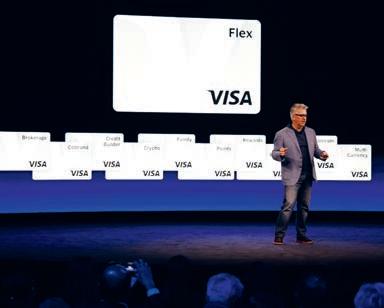













As global commerce continues to evolve, contactless payments have emerged as a critical enabler of financial efficiency, security and inclusion.
By LINESHREE MOODLEY, country head for Visa, South Africa
Digital payment is no longer a peripheral convenience; this technology is now central to the transformation of payment ecosystems worldwide. At Visa, we are committed to advancing this evolution through innovation, strategic partnerships and a steadfast focus on consumer trust.
The adoption of contactless payments has accelerated signi cantly in recent years. Globally, these transactions are projected to account for over 50 per cent of all payments by the end of 2025. South Africa is experiencing a similar trajectory, with approximately 60 per cent of consumers now preferring contactless methods – a trend driven by increased smartphone penetration, ntech innovation and evolving consumer expectations.
Across the African continent, digital payment volumes grew by 16 per cent in 2024, with mobile wallets and contactless technologies playing a pivotal role in expanding access to nancial services. This growth re ects a broader shift toward digital- rst economies where convenience and security are paramount.
The appeal of contactless is simple: it’s fast, secure and seamless. Visa’s Value of Acceptance study found that 70 per cent of South African consumers believe tap-to-pay makes transactions faster and easier. With the average transaction taking less than a second, it’s easy to see why businesses are embracing it.
However, speed is only part of the equation. Security is paramount.
Visa’s advanced encryption and tokenisation technologies have helped drive a 25 per cent increase in consumer trust in


contactless payments over the past year. We invest over $500-million annually in cybersecurity and fraud prevention, deploying state-of-the-art technologies to protect consumers and businesses.
Contactless technology is also proving instrumental in advancing nancial inclusion. In South Africa, ntech companies are leveraging digital platforms to reach underserved populations. A prime example is Visa’s collaboration with Flash, Kazang and Shop2Shop, which provide tools that allow merchants to accept digital payments, manage inventory and build transaction histories – capabilities that support access to credit and formal nancial services. Such innovations are helping to digitalise informal economies and bridge the gap between traditional and modern commerce.
Visa’s partnership with Loop is another powerful example. Together, we are modernising South Africa’s public transport sector by introducing tap-to-phone payment technology in minibus taxis. This innovation allows commuters to pay fares using contactless cards or mobile devices, signi cantly reducing reliance on cash while enhancing safety, ef ciency and convenience for both passengers and operators. This is nancial inclusion in action.
In a similar stride toward digital transformation, Visa has enabled tap-to-pay functionality at the N3 Toll Plaza – one of South Africa’s busiest transport corridors. Motorists can now breeze through toll gates using contactless Visa cards or mobile wallets, reducing congestion, improving travel times and minimising the need for


cash handling. This advancement not only streamlines the travel experience, but also supports broader efforts to digitise payments across the country’s infrastructure.
The future of digital payments isn’t just about cards and phones – it’s about intelligent, arti cial intelligence-powered commerce that moves with you, anticipates your needs and simpli es your life.
Visa’s 2025 Global Product Drop marked a signi cant milestone with the introduction of Visa Intelligent Commerce. This innovation opens our trusted network to a new generation of arti cial intelligence-powered agents capable of autonomously browsing, selecting and purchasing on behalf of consumers. Whether it’s a smartwatch ordering your morning coffee or a virtual assistant managing your grocery list and checkout, Visa is building the infrastructure to make these experiences seamless and secure.
The future of digital payments will be built on three pillars:
• Collaboration between banks, ntechs, merchants and regulators to ensure interoperability and scale.
• Education builds trust and con dence in digital payment systems.
• Innovation that meets consumers where they are – whether in a bustling city centre, a rural village, a local spaza shop or a minibus taxi.
Each contactless transaction represents more than a payment; it’s a step toward a more connected, ef cient and inclusive economy. At Visa, we remain dedicated to enabling this future through leadership, innovation and a deep commitment to empowering individuals and businesses.
South Africa’s payments landscape is evolving. While digital transactions are growing rapidly, the use of cash for payments remains vital for millions. For businesses and consumers, success lies in integrating both cash and digital for broader reach and inclusion, writes Pay@
By December 2024, nearly 90 per cent of banked customers’ transactions were digital, according to a recently published article. However, in a country where over 11 million people remain unbanked or underbanked, cash continues to play a critical role.
Forward-looking businesses understand that digital payments will dominate in the future and recognise the importance of accessibility. In South Africa, where high data costs and limited smartphone access exclude many from app-based systems, being able to pay with
This is where Pay@, a leading payments solutions provider and orchestrator of payments across more than 35 ways to pay, bridges tech with human reality. Whether integrating digital platforms or enabling cash payments at over 9 500 retail locations and 150 000 POS points nationwide, Pay@ empowers businesses to offer payment convenience for all.
Pay@ orchestrates bill payments and e-commerce transactions through the country’s largest banks, national retailers, telcos and ntechs on behalf of leading bill issuers and merchants, such as insurers, municipalities and nancial service providers, helping them serve millions of customers,
Through innovation and accessibility, Pay@ helps businesses maintain reliable revenue streams, reduce costs and improve customer and brand experience, ensuring no customer is left behind.
To stay relevant in South Africa’s evolving payment landscape, your business needs a partner who connects it all.

For more information: payat.co.za


To align with the changes in regulations, designed to remove barriers to entry and promote participation in modern payment systems, greater collaboration is required, writes FIRSTRAND BANK
The rst half of 2025 has seen signi cant momentum in the global and domestic payments environment, with much activity and change underway in the payments space.
Mpho Mofokeng, Treasury and Trade Solutions – Transact Head for RMB, says: “The payments landscape is evolving rapidly, and RMB’s goal is to work alongside our clients and industry participants to de ne the future of modernised payment systems.”
To meet evolving client needs, close collaboration on adoption, client participation and true partnership will become essential as the industry continues evolving.
Ravi Shunmugam, FNB EFT product house CEO, says: “No single stakeholder group can create an effective, inclusive and innovative payments ecosystem. The continued evolution in thinking, which favours the reliance on true partnerships between traditional players and emerging players, is key to shaping the future of payments in South Africa and realising the intended bene ts initially set out in the South African Reserve Bank’s (SARB) Vision 2025 for the National Payment System (NPS).”
Published in 2018, Vision 2025 outlines nine goals designed to foster nancial inclusivity, a transparent regulatory and governance framework, digitisation, interoperability and exibility. Creating an inclusive ecosystem was noted as a primary metric for successful payments modernisation in South Africa. It is therefore paramount that nonbanks are enabled to participate in the payments ecosystem. To facilitate the direct participation
of nonbanks, changes in regulations and policies are required in addition to changes in system capabilities.
To further drive the objectives set out in Vision 2025, the SARB has commenced work to redesign its licencing framework and participation rules to enable greater access and participation in the national payments system. The NPS Bill intends to expand direct participation of nonbanks in clearing and settlement without the need for bank sponsorship – removing barriers to entry and promoting participation in modern payment systems such as PayShap. As of March 2025, the NPS Bill is being prepared for public comment and both banks and nonbanks have been working closely with the regulator to ensure regulation that enhances competition while protecting clients by not introducing risk and instability to the payments network.
Over and above the bill, revision of current regulation and the establishment of governance frameworks that will best support future business models will also play a role in shaping the new payments landscape:
• The Banks Act Exemption Notice intends to exempt the issuance of electronic money from the Bank Act 94 of 1990 to enable nonbanks to offer payment accounts and services.
• The Authorisation Framework outlines the requirements for licensing and authorisation of payment activity (including clearing and settlement).
• The proposed establishment of PIB – the design of a new Payments Industry Body that is more inclusive and encompasses banks and nonbanks, fostering collaboration and competition between stakeholders.
“THE PAYMENTS LANDSCAPE IS EVOLVING RAPIDLY, AND RMB’S GOAL IS TO WORK ALONGSIDE OUR CLIENTS AND INDUSTRY PARTICIPANTS TO DEFINE THE FUTURE OF MODERNISED PAYMENT SYSTEMS.” – MPHO MOFOKENG
Updates to established payment systems will also ensure alignment with international technical standards and anti-money laundering control standards.
To drive these changes, First Rand Bank (FRB) has placed increasing strategic importance on payments, leading to a signi cant focus on payments strategy, executive structure, the operating model, resource capacity, execution, architecture and investment. FRB is approaching this together with clients to ensure they are well-positioned and aligned with the regulatory changes and objectives.
Tamara D’Onofrio, Treasury and Trade Solutions – Client Group Head, says: “RMB understands the importance of bringing clients along on this journey, informing them on how this impacts their businesses. We are invested in the co-creation of value with our clients and our partners and committed to taking meaningful steps to engage with them as projects mature suf ciently and opportunities present themselves.”
FRB welcomes the shift in the payments landscape toward greater inclusivity and global compliance and continues to work closely with clients and industry peers to navigate the future of payments in the country together.


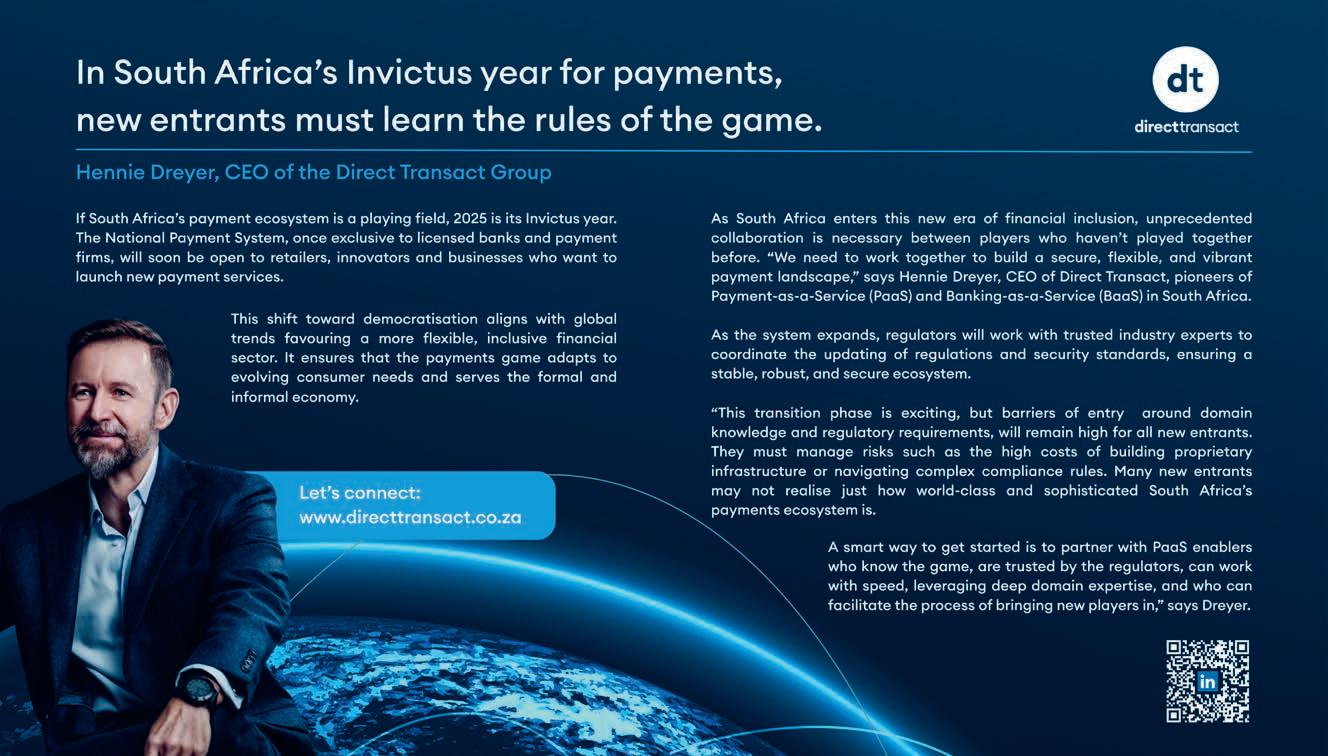

Initially driven by COVID-19 requirements, the implementation of contactless banking technology has now reached a stage of widespread acceptance, writes RODNEY WEIDEMANN
Contactless payments have evolved in recent times. Accelerated by the unique demands of the COVID-19 pandemic, they have moved from novelty to necessity and are now being increasingly embraced by banks, ntechs, and retailers alike.
End users and merchants enjoy the speed of the transaction that assists in queue busting, while not compromising the security of the transaction. This is further recognised by the likes of nancial solutions providers and device manufacturers, as their new solutions and products are increasingly enabled for contactless payments.
Leonard Shenker, joint CEO at Walletdoc, says the pandemic and the many fears around transmission and hygiene certainly brought this technology to the fore and led to far quicker adoption than might otherwise have been the case. “Since then, merchants and customers have discovered the bene ts of this technology. It not only speeds up the transaction, but also offers convenience. Shop owners nd they get more customers through the till in the same amount of time, while the customers enjoy a speedier transaction, coupled with a better overall consumer experience.”
Steven Cohen, co-founder of Legend Tags, agrees that the surge in contactless payments globally is primarily driven by convenience, speed and security. “Consumers gravitate towards the quickest and easiest way to pay. Scanning a QR code and using existing payment gateways – such as Apple Pay and Google Pay –reduces checkout times and improves security, as only the gateways themselves have access to the clients’ personal details.
“We’ve tapped into these same drivers to enable everyday person-to-person transactions. People increasingly carry little or no cash, so providing a quick, secure way to pay a car guard or street vendor, via a simple tap or scan, ful ls a real need.”
By making the experience fast, safe and effortless for both parties, he continues, it is easy to extend the bene ts of the contactless revolution to every corner of daily life. This broad utility is why contactless payments have seen such rapid adoption: they make life easier for consumers and businesses, in ways both big and small.
Wearable solutions offer additional convenience, speed and ultimately security, which culminate in an even more seamless experience for consumers. Alternate technologies for merchants offer cost-effective mechanisms to adopt contactless payments, increasing the likelihood, for example, of uptake in less formal economies.
Source: KPMG

Jason Viljoen, head of card digitisation at FNB, notes that while contactless-enabled smart devices initially entered the market at a higher price point, the past few years have seen providers incorporating the technology into many lower-end devices. “Smart devices and wearables resonate with all members of society, with the bene t being the continued adoption of digital platforms for contactless payments and digital banking in general. Customers particularly enjoy the convenience and security contactless offers, from the activity itself to the shortened queue times,” he says.
Viljoen says customers are always in control of their card or device, simply having to tap the point-of-sale (POS) device to effect payment. “Customers enjoy the simplicity and security of not only using a digital wallet (such as Apple Pay or Google Pay) to pay in-store, but also when checking out online.”
Liesl Slabbert, partner and Southern Africa payments lead at KPMG, points out
“SHOP OWNERS FIND THEY GET MORE CUSTOMERS THROUGH THE TILL IN THE SAME AMOUNT OF TIME, WHILE THE CUSTOMERS ENJOY A SPEEDIER TRANSACTION, COUPLED WITH A BETTER OVERALL CONSUMER EXPERIENCE.”
– LEONARD SHENKER
that among the bene ts for users are a more seamless customer experience, increased convenience – there is less need to carry a wallet – better security and even loyalty bene ts that are offered by many banks.
“For merchants, the bene ts typically include the fact that a more seamless shopping experience means customers are happier and thus also more likely to return, while faster and easier processing of payments at checkout delivers additional downstream bene ts. These include reduced queues in peak periods and higher transaction volumes.”
Dan Wagner, joint CEO at Walletdoc, agrees that speed and convenience are bene cial to both, while the health and hygiene bene ts are equally obvious.

“Security is key, and since a smartphone utilises biometric security, it overcomes the challenge of using a PIN, which is outdated technology anyway. When coupled with tokenisation, it de nitely indicates the way forward from a security perspective.”
Wagner appreciates that now, contactless payments can be enabled across multiple wearable devices – including watches and rings – taking payment beyond the traditional card. “This only makes sense, since we all carry our phones all the time and most wear watches. So, from an applicability point of view, this enables even more payment methods.
“We cannot, however, forget South Africa’s rural areas. The importance of SoftPoS (software point-of-sale that turns smartphones into card readers) solutions here shouldn’t be underestimated, as this contactless technology can be leveraged – in conjunction with the right payment players – to enable of ine payments.”
Darryl Froom, co-founder of Legend Tags, adds that it is important to remember that contactless doesn’t always mean “high-tech”. “A person might use a simple QR code printed on a piece of paper. This is exactly our organisation’s approach: we empower people who may not have smartphones or bank accounts – like car guards, petrol attendants and informal vendors – to receive digital payments
Software point-of-sale that turns smartphones into card readers (SoftPOS) and offline solutions for rural and unbanked communities present an opportunity for financial inclusion. SoftPOS is a low-cost alternative to traditional terminals, ideal for small vendors, pop-up stores and informal traders. It however requires near-field communication-enabled smartphones, which is still a barrier for some.
Source: FNB
via a personal QR code tag. “No sophisticated device is required on the recipient’s part; a basic mobile phone is enough to register, as it uses SMS technology to verify the vendor, and the payer’s phone does the scanning.”
Netsai Ngidi, product head at FNB Merchant Services, suggests that the contactless solutions the bank supports are all enabled through levels of encryption, tokenisation and other key security elements. “Tokenisation plays a crucial role, ensuring sensitive credentials are substituted by unique nonsensitive tokens, bound to speci c use-cases – further securing customers against any possibility of compromise.
“In addition, FNB’s multilayered approach to security means that further controls, risk rules and various tools are constantly at work to ensure a secure payments experience.”
Slabbert agrees on security’s importance, noting that contactless payments are best secured through a combination of advanced technologies, regulatory oversight and industry best practices. “These include a dual security framework, transaction limits and PIN requirements, and fraud detection systems. Tokenisation plays a crucial role, especially when considering digital wallet adoption, as it replaces sensitive card information with unique identi ers, reducing the risk of fraud and data breaches.”
Shenker is of the opinion that banks and ntechs are already doing a great job of deploying infrastructure that is contactless-enabled.

“The future of contactless is super bright, adoption is taking off, and with continued innovation and adoption, it will become the de facto
payment standard, which should mean that, in the near future, we will witness a signi cant reduction in cash usage,” he states.
Ngidi agrees, suggesting that contactless payments are poised for continued exponential growth. “The future lies in ‘blended’ solutions, combining near- eld communication tokens, QR codes and of ine capabilities, to serve both urban and rural markets. If banks, ntechs and regulators collaborate, contactless could become the dominant payment method in the next ve years,” she concludes.
According to KPMG, a 2020 Mastercard study found that 75 per cent of South African consumers are using contactless payments. However, it must be acknowledged that key challenges exist for those with less access – such as:
• Ability to afford/obtain the required technology (for example, smartphones/near-field communication-enabled cards).
• Access to enabling infrastructure (for example, telecommunications network and electricity).
• Trust concerns (for example, around fees and “big brother” visibility).
• Financial/digital literacy (for example, understanding how to use such payment technologies).
While contactless payments technically offer security and convenience to all members of society, the need remains to focus on resolving these challenges – through alternate (more affordable) technology and infrastructure, and education.
Follow: Leonard Shenker @ www.linkedin.com/in/leonardshenker
Liesl Slabbert @ www.linkedin.com/in/liesl-slabbert-0a584743
Netsai Ngidi @ www.linkedin.com/in/netsai-ngidi-405368a3
Jason Viljoen @ www.linkedin.com/in/jason-viljoen-7539485
As South Africa’s payments landscape evolves, WALLETDOC is ready to ensure executing payments is simpler, smarter and safer
South Africa’s payments industry has always had a reputation for being innovative and complex. With a banking sector that is sophisticated by emerging market standards, the country has historically punched above its weight when it comes to digital payment systems. However, the past few years have brought seismic shifts to the way South Africans think about and execute payments.
From contactless cards and mobile wallets to real-time EFTs, the transformation of the payments landscape has been rapid. Consumers now demand simplicity, merchants expect affordability, and regulators prioritise safety and inclusion. In the eye of this storm of change is a new breed of ntechs reimagining how South Africans pay, get paid and manage their money.
One of these trailblazers is Walletdoc, a digital payments platform co-founded in 2015 by Dan Wagner and Leonard Shenker that addresses a very speci c need: simplifying how people pay their bills. Today, it’s become one of South Africa’s leading payments processors, enabling businesses to accept payments online, in-app and in-store.
However, to appreciate where Walletdoc ts into the picture, it’s worth understanding the broader shifts that have shaped – and are still shaping – the local payments industry.

The COVID-19 pandemic accelerated a transition already underway. Cash, once king in many parts of South Africa, suddenly became a health concern. Lockdowns made physical payments inconvenient and consumers, from Sandton to Soweto, were forced to experiment with digital channels. What might have taken a decade instead happened in less than two years.
Retailers responded by investing in contactless payment systems. Banks ramped up their mobile offerings. Fintech

start-ups found a growing and receptive audience. A 2023 Payments Association of South Africa report estimated that digital wallet usage had grown by over 40 percent in two years and EFT volumes had reached record highs.
In theory, the digital revolution should have removed friction from the payments process. In practice, though, many South Africans still struggle with inef ciencies. Too many steps, slow clearance times, payment failures and security concerns remain common grievances.
This is where platforms like Walletdoc have found resonance. By starting with a single use case, bill payments, the company was able to build trust around solving real-world pain points. “We saw a major opportunity in making utility payments smarter,” says Shenker. “People were still driving to municipalities or queuing in supermarkets to pay bills using their card. We thought, what if you could just do it instantly from your phone?” THE TRANSFORMATION OF THE PAYMENTS LANDSCAPE HAS
Walletdoc’s consumer bill payment app quickly gained traction. However, its real power lies in what happened behind the scenes: the automation of the payments work ow, the validation of payment data and integration with municipal nancial systems. This fusion of simplicity and sophistication is what has helped Walletdoc become a trusted player not just for consumers, but for businesses, too.
As digital payments become the norm in South Africa, the opportunity isn’t just in serving consumers or small businesses; it’s in helping large enterprise merchants transform how they transact, reconcile and operate at scale.
South Africa’s enterprise sector, including telecoms, insurance, gaming, education, retail, healthcare and beyond, faces increasing complexity in managing high-volume, recurring and multichannel payments. For these organisations, the payment process isn’t a simple transactional step; it’s tightly interwoven with customer experience, operational ef ciency and nancial reporting.
The challenges are substantial: fragmented systems, legacy integration hurdles, customer data inconsistencies and reconciliation delays all contribute to inef ciencies and cost. Add to that the pressure to meet evolving consumer expectations – instant payments, seamless digital interfaces and exible payment options – and it becomes clear that enterprise merchants need more than a traditional payments processor.
This is where platforms like Walletdoc are unlocking real value. Walletdoc has grown into a full-service payments platform designed to handle the scale and sophistication required by enterprise-grade clients. The company enables large merchants to accept and automate payments across card, bank account, QR and all the major mobile wallets (Apple Pay, Samsung Pay, Google Pay and Click2Pay) – all within a highly secure, compliant and deeply integrative framework.
“PEOPLE WANT TO KNOW THEY’RE DEALING WITH A COMPANY THAT’S LOCAL, ACCOUNTABLE AND REACHABLE. WE’VE BUILT OUR SUPPORT STRUCTURES AROUND THAT PRINCIPLE.”
– LEONARD SHENKER
Walletdoc’s cloud-based platform allows for settlement tracking, intelligent failed payment handling, automated billing integrations and full reconciliation, offering nance teams at major enterprises a level of visibility and control often missing in legacy systems.
“Enterprise clients are increasingly looking for infrastructure partners who can plug into their existing work ows with minimal friction and maximum reliability,” says Shenker. “It’s not just about collecting money; it’s about streamlining the entire receivables value chain.”
Major enterprises now rely on Walletdoc to improve how they collect payments, with end users enjoying a much smoother payment experience across devices. Walletdoc’s enterprise offering includes fully branded, white-label payment ows and APIs that allow companies to own the customer journey while bene tting from Walletdoc’s underlying infrastructure.
Importantly, the platform is built with South Africa’s regulatory and infrastructural realities in mind, supporting things such as reference validation, batched reporting and integration with enterprise resource planning systems.
In a landscape where consumer payment preferences are shifting faster than many enterprise systems can adapt, agility is critical. Enterprises that once viewed payments as a cost centre are now seeing it as a source of competitive advantage. By embracing modular, scalable platforms like Walletdoc, they are not only reducing operational drag, but also unlocking strategic value, from faster cash ow to richer data insights.
Indeed, with growing regulatory requirements, heightened consumer expectations and the emergence of open banking frameworks, businesses need more than just a payment gateway; they need partners who understand their operational realities.
Another area of innovation is real-time payments, which are gaining momentum globally and locally. South Africa’s Rapid Payments Programme (RPP), also known as PayShap, championed by BankServAfrica and the South African Reserve Bank, aims to bring real-time, low-cost payments to the masses.
While adoption is still in its early stages, the promise of real-time rails is huge: instant payments, reduced cash dependency and easier peer-to-peer transactions across banks. This will undoubtedly shape the next wave of ntech innovation.
Walletdoc is well-positioned to play a role in this transition, having already built a platform that processes billions of rands worth of PayShap payments with exceptional transaction approval rates. Its systems are designed for scalability and interoperability – a crucial requirement as the RPP matures and open application programming interfaces (APIs) become standard.
With growth comes risk, and the payments sector has seen its fair share of fraud attempts, phishing scams and data breaches. Trust is the currency of digital payments, and platforms that succeed are those that invest heavily in security and compliance.
Walletdoc’s approach has been to embed security into its architecture –evident from its Level 1 PCI-DSS and PCI 3DS certi cations. However, more than just the technical side, it’s also about transparency and support. “People want to know they’re dealing with a company that’s local, accountable and reachable,” says Shenker. “We’ve built our support structures around that principle.”
This emphasis on local relevance is an important point. While global giants may dominate headlines, local players who understand the regulatory landscape, consumer behaviour and infrastructural constraints often offer better tailored solutions.
In a rapidly evolving payments landscape, the players that lead are those that not only adapt, but also anticipate – building for where the market is going, not just where it is. At the heart of Walletdoc’s strategy is a deliberate focus on innovation velocity and deep technology ownership. The company doesn’t just plug into third-party systems; it builds its own infrastructure, giving it the agility to respond quickly to shifting demands and regulatory requirements and to innovate on its terms.
“We are passionate about reducing friction in payments, making every transaction faster and easier,” says Wagner. “Our speed of innovation is unmatched – Walletdoc pioneered tokenisation, years ahead of its competitors. Owning our technology stack empowers us to launch new features, counter emerging threats and adapt to global standards signi cantly faster than providers dependent on legacy systems or third-party platforms.”
A prime example is Walletdoc’s in-house implementation of 3D Secure authentication , the protocol used to reduce card-not-present fraud. By handling the authentication layer internally, Walletdoc can optimise the ow to reduce friction for users, ensuring payments are both secure and seamless. This is especially valuable in high-volume enterprise environments where even small improvements in payment success rates or checkout times translate into meaningful business impact.
For businesses seeking even more exibility, Walletdoc offers native mobile solutions, allowing them to embed secure payment capabilities directly into their mobile applications. This means customers can make payments without ever leaving the brand’s frameworks – a competitive advantage in an increasingly mobile-driven world.
Walletdoc has also aligned itself closely with evolving global frameworks, including Digital Authentication Framework , which allows trusted merchants to process transactions with fewer authentication challenges, improving approval rates while still maintaining strong risk controls.
Another forward-looking innovation on the roadmap is support for passkeys,
the alternative to passwords and OTPs, championed by Visa and Mastercard. Passkeys enable device-based, biometric-secured login and payment approval, eliminating the friction and vulnerability of traditional password systems. For consumers, this means fewer abandoned carts and better security; for enterprise merchants, it’s a step towards truly next-generation authentication.
These innovations are not just technical upgrades; they represent a strategic investment in user trust, operational ef ciency and future readiness. In an industry where the difference between success and failure is measured in milliseconds and basis points, the ability to build, adapt and scale quickly is no longer a luxury; it’s essential. Walletdoc’s technology- rst DNA ensures its clients are not just keeping up with the future of payments, but also helping to shape it.
Arti cial intelligence (AI) is reshaping the payments landscape, driving ef ciency, security and personalisation across industries, including shopping and e-commerce. AI-powered systems are revolutionising how consumers interact with online stores, analysing browsing behaviours, purchase history and preferences to deliver hyper-personalised recommendations and seamless checkout experiences.
In payments, AI enhances fraud detection, optimises transaction processing and even enables dynamic pricing strategies.
As machine learning models continue to evolve, businesses can anticipate customer needs more accurately, creating intuitive payment solutions that integrate into the shopping journey effortlessly. Walletdoc is embracing this AI-driven evolution, streamlining digital payments while enhancing usability for businesses and shoppers alike. By harnessing intelligent automation and personalised insights, Walletdoc is helping South Africa move towards a more connected and responsive payment ecosystem.
In this environment, success belongs to those who can simplify the complex, secure without obstructing and collaborate without compromising. Walletdoc is more than just a payment processor. It’s a catalyst for smarter commerce, a partner in growth and a pioneer in payments innovation. Its relentless focus on technology, local expertise and customer-centric approach has made it a leader in South Africa’s payments space. As South Africa’s payments landscape continues to evolve, Walletdoc is ready, not just to keep pace, but also to lead the way.



For more information: +27 87 550 8255 sales@walletdoc.com walletdoc.com
ENTERPRISES THAT ONCE VIEWED PAYMENTS AS A COST CENTRE ARE NOW SEEING IT AS A
Reducing friction in digital payments is key to enabling seamless commerce across Africa, writes DAVID KING , vice president of sales, MEASA, at ACI Worldwide
In Africa’s mobile- rst economies, the shift to digital payments is reshaping the fabric of commerce. From paying for county services in Nairobi to ride-hailing apps in Lagos, fast seamless digital transactions can boost gross domestic product and connect millions to the economy.
ACI Worldwide’s Real-Time Payments: Economic Impact and Financial Inclusion 2024 report states that real-time payments are projected to contribute nearly R270-billion in additional gross domestic product growth to Nigeria and South Africa by 2028. In the same time frame, the share of the banked population in Nigeria is expected to increase by 6.5 per cent. South Africa, which already has 84 per cent banking penetration, could add 425 000 previously excluded individuals to the nancial system.
However, this promise of improved nancial access and economic growth is too often hindered by failed payments, clunky checkouts and abandoned carts, re ecting a deeper issue in the merchant space: payment experiences not yet built for the realities of the continent.
Friction in digital payments isn’t just about inconvenience; it undermines trust. In Africa, where many consumers are engaging with digital payments for the rst time, trust is the foundation of adoption. Cumbersome checkout ows, repeated input of personal and payment details, and inconsistent mobile interfaces are just the surface issues. Beneath that lie technical weaknesses, such as poor payment routing, outdated tokens or a lack of real-time analytics, that often result in failed transactions.
This experience stands in stark contrast to the seamless expectations set by global digital wallets like Apple Pay and Google Pay, which have normalised one-touch transactions and intuitive interfaces. According to ACI’s Unwrapping Checkout Trends 2024 report, alternative payment methods are shaking up the payments mix across the globe, with payment methods via buy now, pay later and digital wallets
growing at 237 per cent and 209 per cent, respectively.
With a high mobile phone penetration rate across the continent of approximately 60 per cent, the challenge for African markets is adapting to the nuances of mobile- rst consumers whose devices are often their only gateway to the internet.

Payments orchestration allows merchants to manage all payment channels and providers intelligently in a uni ed platform and streamline transactions to maximise success rates while reducing costs. Instead of sending every transaction through a static, predetermined path, the platform’s automated retry logic can dynamically shift transactions to a fallback acquirer, eliminating merchant headaches over failed payments. Its robust and scalable architecture is designed to withstand transaction surges during ash sales, concerts or seasonal spikes.
Beyond backend technology, user experience plays a frontline role. Streamlining the checkout process, reducing form elds, minimising redirects and enabling one-click checkout can signi cantly decrease abandonment rates. On mobile, especially, simplicity is currency. ACI’s mobile software development kit supports this by embedding secure, fast and intuitive payment options directly into mobile apps. With support for multiple local and global payment methods, languages and currencies, it bridges the gap between global standards and local realities.
ORCHESTRATION
Frictionless payments should never come at the expense of security. Instead of applying the same level of scrutiny to every payment, the opportunity lies in adopting smarter, context-aware security. Risk-based authentication, behavioural biometrics and device recognition technologies can help distinguish between trusted users and high-risk transactions. For example, Kenya has implemented biometrics in mobile money SIM registrations to reduce the risk of fraudsters using stolen or unregistered SIM cards for fraudulent mobile money transactions.
The proliferation of arti cial intelligence-driven fraud tactics and stolen data on the dark web is supercharging threats in both scale and speed, making it harder than ever for merchants to distinguish real customers. Merchants should harness arti cial intelligence predictive modelling to detect threats and use payments intelligence signals to eliminate false positives without disrupting genuine transactions.
In a continent where digitalisation is accelerating but digital payments are still taking shape, the stakes are high, but so is the potential. Consumers’ buying journeys are evolving with more channels, hybrid services and diverse payment options. Payments play a pivotal role in shaping the customer experience because a smooth payment is often the nal and most memorable touchpoint.







Integrating a growing array of services into one convenient, mobile-friendly package, super apps are winning over consumers. How do they work and are they safe? ANTHONY SHARPE swipes a little deeper
For many people these days, life without a smartphone is unthinkable. They’ve become our super devices, conduits to the myriad services of the digital world. These ubiquitous little slabs of metal, glass and plastic we all constantly stare into facilitate communication, navigation, photography, entertainment, transport, commerce, endless time-wasting, and so much more, all in one, terri cally convenient package.
If smartphone adoption has accelerated thanks to their all-in-one convenience, then it stands to reason that software should follow suit. Cue the super app – a mobile application that combines a broad range of services and functions into one. If you’ve spent any time in Asia, the concept should be familiar: China has WeChat, India has Tata Neu, Taiwan has Line, Indonesia has Gojek and Grab is available across Southeast Asia.
On the African continent, mobile adoption is massive, leapfrogging infrastructural de ciencies to connect people with digital services, making it
Mariam Cassim
an exciting market for the development and adoption of super apps. These apps also offer the opportunity to bring nancial services to unbanked and underbanked populations in a streamlined and convenient way.
South Africa is no exception, increasingly adopting convenient, mobile- rst solutions, including VodaPay and the Discovery Bank app.
Vodacom drew on Alipay’s wealth of experience when it partnered with the tech giant to develop VodaPay, a uni ed payments, shopping and lifestyle platform.
“VodaPay is a mobile- rst platform that was created to make nancial and digital inclusion a reality for all South Africans,” says Mariam Cassim, CEO of Vodacom Financial and Digital Lifestyle Services.

“When it launched four years ago,
As of March 2024, VodaPay had achieved 10.4 million downloads and 5.8 million registered users, reflecting an 83 per cent and 79.4 per cent increase respectively from the previous year.
Source: Vodacom
the app focused on offering customers exclusive deals, but it has since evolved into a fully- edged digital highway providing access to a myriad solutions.”
These solutions include nancial services, digital wallet functionality, the ability to shop at a variety of retailers and restaurants, along with cashback rewards, coupons and exclusive deals.
“We have carefully selected local and international developers and service providers who facilitate the functionalities within the app, creating a customer-friendly ecosystem that allows
“VODAPAY IS OPTIMISED FOR PERFORMANCE ON A WIDE RANGE OF ANDROID DEVICES, INCLUDING LOWER-END SMARTPHONES THAT DOMINATE THE MARKET.”
– MARIAM CASSIM











us to scale and diversify its offerings,” says Cassim. “Integration is achieved through robust teams and management frameworks. This ensures consistency in user experience, security and operational ef ciency.”
Cassim says convenience, the need for digital space and reduced data consumption are key for super app success. Data is a crucial consideration for the South African market in particular, along with hardware limitations. “VodaPay is optimised for performance on a wide range of Android devices, including lower-end smartphones that dominate the market. Continuous testing and user experience improvements ensure that even users with limited connectivity enjoy smooth navigation and reliable functionality.”
This requires aggregation of a lot of nancial and personal data in one place, something critics have pointed out makes super apps somewhat of a honeypot for cybercriminals. For this reason, Cassim says data security is enforced through multilayered encryption, biometric authentication and fraud detection. “A dedicated cybersecurity team monitors threats twenty-four hours a day, seven days a week, and all third-party integrations are rigorously vetted for compliance with the Protection of Personal Information Act and the applicable international data security standards.
“We ensure users are informed of their privacy rights and how to exercise them within the app. We have further endeavoured to keep them aware of known scams or



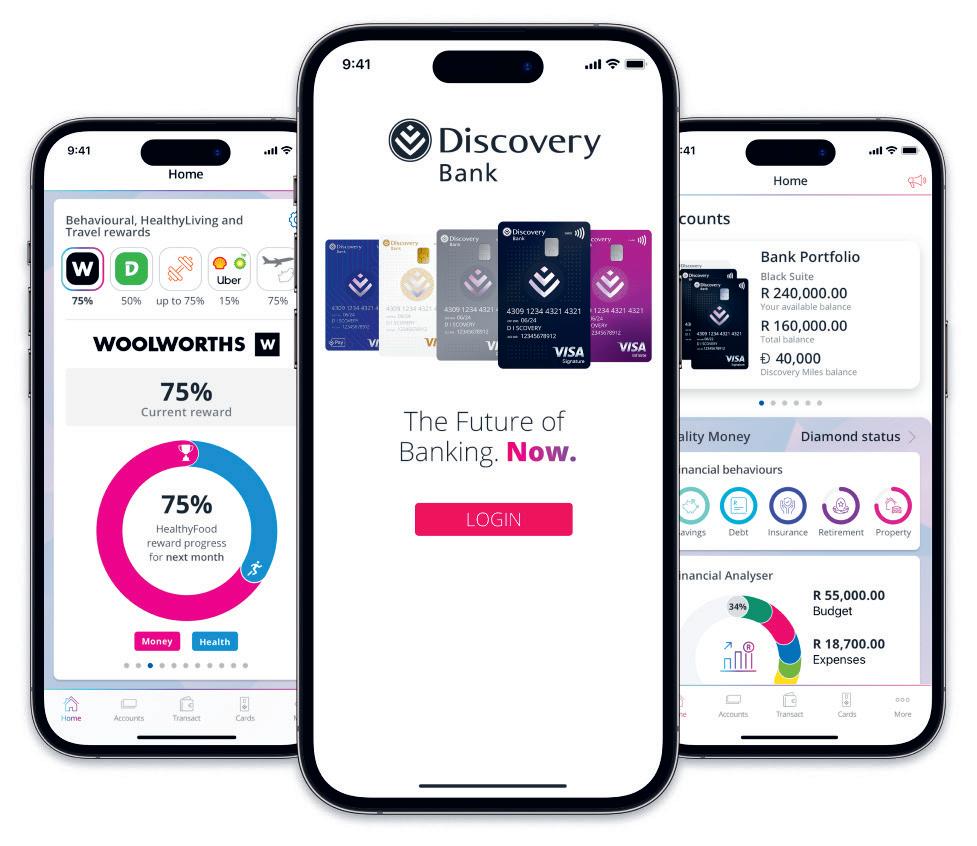

“CLIENT EXPERIENCE IS CRITICAL: WE ARE COMPLETELY FOCUSED ON MAKING THIS AS SIMPLE AND INTUITIVE AS POSSIBLE.” – NIC SALMON
threats in the market so they are also equipped with the knowledge of how to protect their personal information.”
Moving forward, Cassim says super apps are likely to consolidate further, especially as dominant platforms absorb new capabilities and users gravitate toward convenience. “However, niche apps may still thrive in specialised areas such as healthtech or agritech. Ultimately, the winners will be those who best integrate local relevance with seamless, delightful digital experiences.”
With its diversi cation from health insurance into life and short-term cover, along with behavioural banking, Discovery seems like a natural t for a super app. The Discovery Bank app offers bundled functionality, with access to nearly all the group’s services under one login, with a uni ed look and feel across the board, although this is more a natural upshot of Discovery’s customer experience approach than a formal strategy.
“We are a digital bank, so our app is in many respects like a bank branch that’s available twenty-four hours a day, seven days a week on your phone,” says Nic Salmon, chief product of cer at Discovery Bank. “As a result, client
experience is critical: we are completely focused on making this as simple and intuitive as possible, and on leveraging technology to deliver better features.

Our clients can access our full set of products and services directly from the app and even have one our consultants guide them through it in real-time through a securely authenticated session.”
strategy is their nancial wellness programme, Vitality Money. “Our whole value proposition pivots around that.
people to understand their nancial position. This is supported by a range of integrations that pull in data and algorithms that interpret that data and convert it into information,


easily understandable statuses re ecting nancial health. Several rewards and incentives are also linked to these Vitality Money statuses, many of which are directly accessible through the app.”
Discovery Bank chief information of cer Jérôme Frey describes the approach as building an ecosystem that makes the customer journey between product houses seamless, so there is no difference between banking, Vitality, insurance, and so forth.
“We’re almost religious in terms of maintaining the look and feel of the app. Customers get excited about that. They don’t get excited if you simply offer a frontend that requires them to get authenticated again before moving to another app.” That also applies to Discovery’s partners, which include Telkom, cellular networks, municipalities and stock trading platforms.
Of course, that means the authentication needs to be right from the get-go. “Our app is fully biometric, from the onboarding process, checking facial recognition against Home Affairs and other databases,” says Frey. “Once you’ve passed the test, however, we know who
Globally, Asia leads super app adoption. As of 2024, WeChat had more than 1.3 billion users, integrating messaging, payments, e-commerce, and more. Its success has inspired African telecoms and fintechs to replicate multifunctional app ecosystems tailored to regional needs.
Source: Statista
you are and our partners rely on the fact that our process is bulletproof. They rely on the biometrics in the app to ensure authentication is valid.”
Frey believes South Africa is primed for super app adoption. “We have a young, vibrant population. If you give them an easy, integrated, mobile offering that addresses a real need in a better way, consumers will adopt it.”

Mariam Cassim, CEO of Vodacom Financial and Digital Lifestyle Services, says the company has learned four key lessons about customer acquisition and retention on its journey with VodaPay:
• Simplicity wins.
• Incentives matter.
• Trust is critical.
• Localisation is key.
“OUR APP IS FULLY BIOMETRIC, FROM THE ONBOARDING PROCESS, CHECKING FACIAL RECOGNITION AGAINST HOME AFFAIRS AND OTHER DATABASES.” – JÉRÔME FREY
Follow: Mariam Cassim @ www.linkedin.com/in/mariam-cassim-7ab41724
Jérôme Frey @ www.linkedin.com/in/jérôme-frey-2b5a021
Nic Salmon @ www.linkedin.com/in/nic-salmon-4a7431302


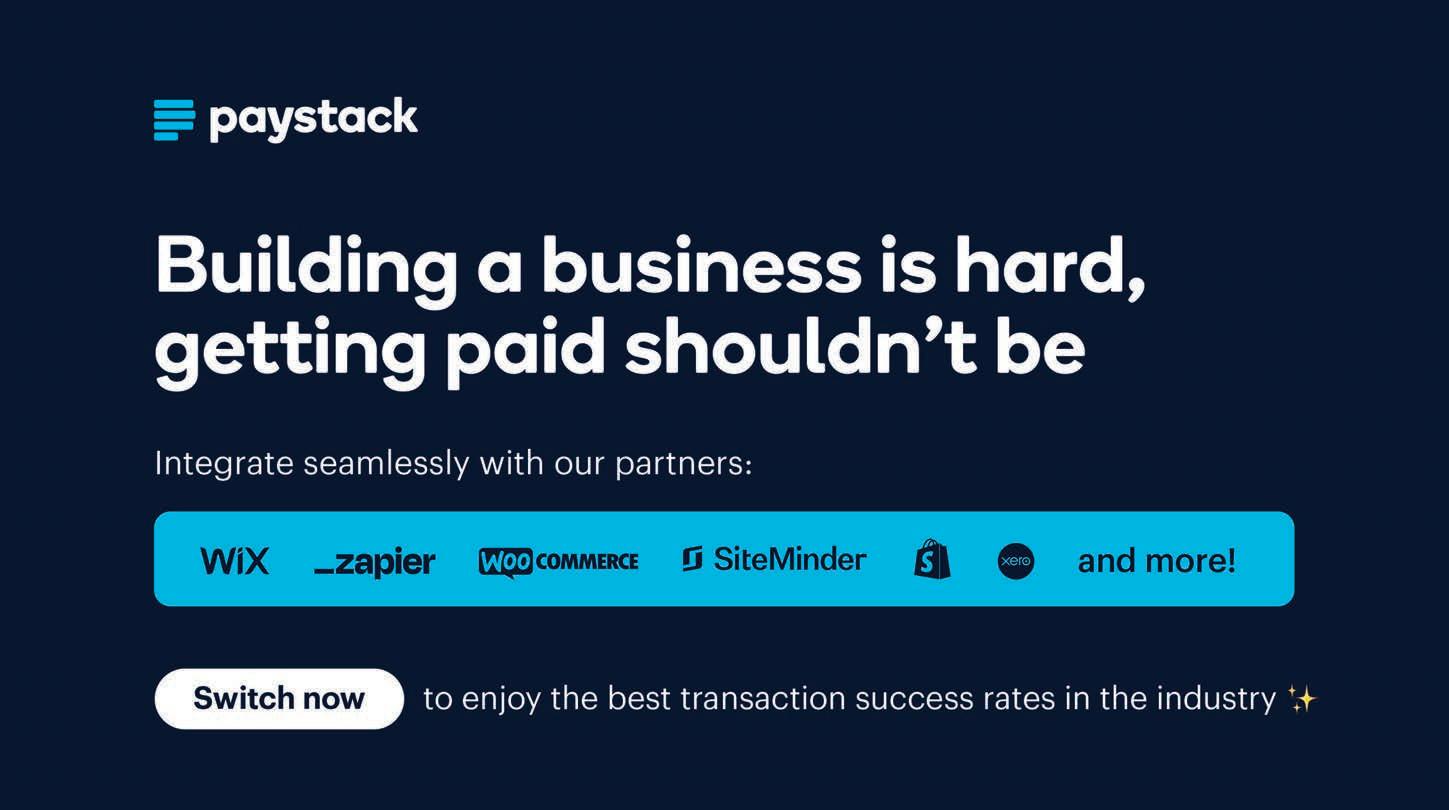
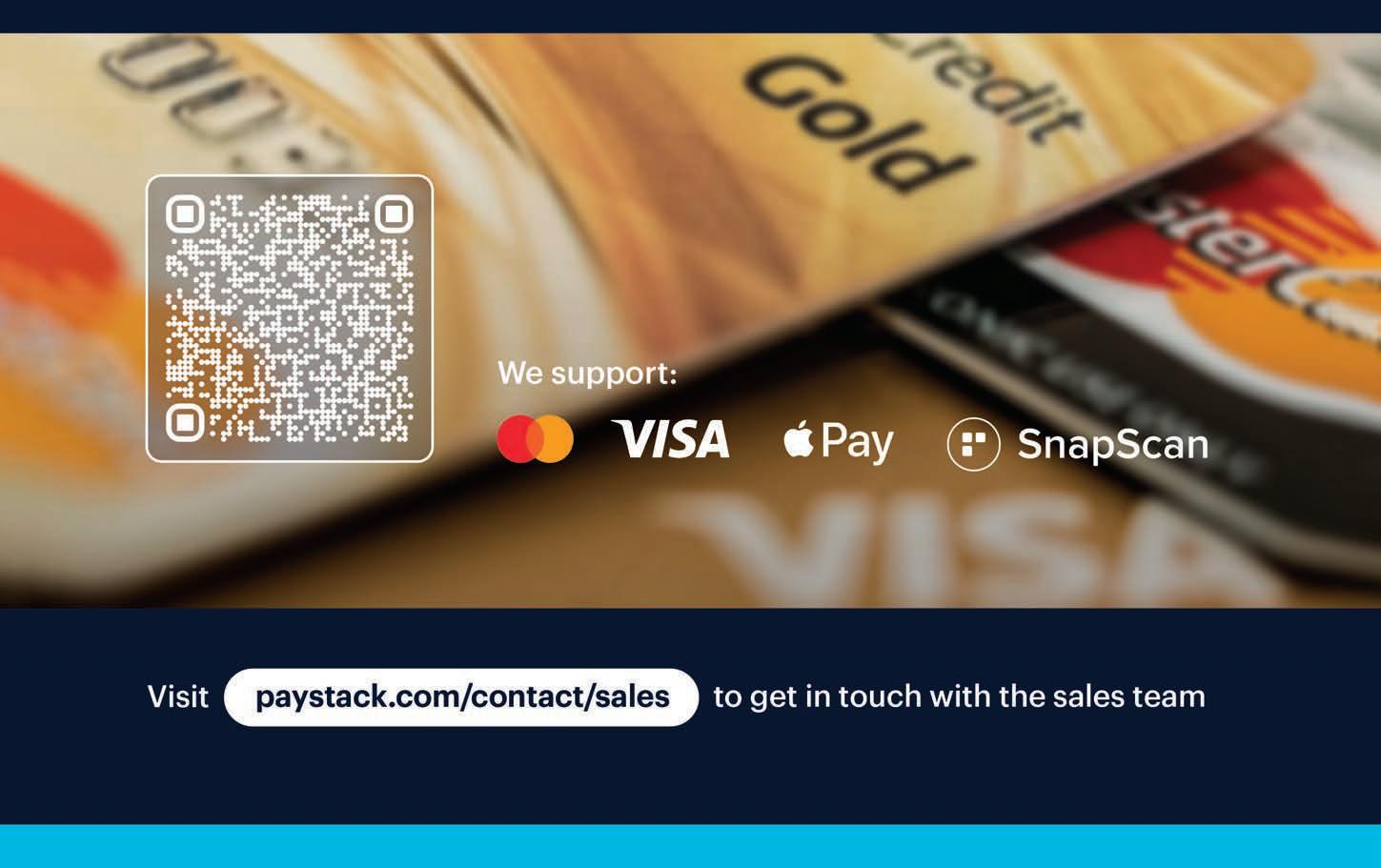

Shifts in how we interact with money, along with technology, are prompting a rethink of wealth from the ground up. By
BEN CASELIN
, CMO at VALR

In the townships of South Africa, the word “prosperity” rarely aligns with lived experience. Here, daily life is shaped by limited infrastructure, generational poverty and exclusion. Traditional de nitions of prosperity – built around material wealth, formal employment and access to formal banking – fall at in communities where even basic services are scarce. However, Bitcoin offers a different starting point, not as a shortcut to wealth, but as a tool to reframe what prosperity can mean and how it can be achieved.
This was discussed on the podcast “VALR Un ltered: Money Meaning & Society”, where I had the pleasure of speaking with Bitcoin Ekasi’s Hermann Vivier. Bitcoin is often misunderstood as a speculative asset or a complex technology that only bene ts the nancially savvy. However, in places like Mossel Bay’s Bitcoin Ekasi, it’s being used in ways that go far beyond investment, becoming a gateway to dignity and independence. When residents begin to use Bitcoin to buy phone credit or receive payments for small services, they’re not just experimenting with digital money; they’re participating in a different kind of economy.
INCLUSION THROUGH PARTICIPATION
Crucially, Bitcoin does not require intermediaries. There’s no need for approval from a bank, no waiting in queues, no paperwork. In township environments, where
traditional institutions often act as barriers rather than gateways, this matters. Bitcoin allows people to transact, save and plan without asking for permission. This peer-to-peer structure isn’t just a technical feature; it re ects a deeper principle: inclusion is earned through participation, not granted by institutions. However, technology alone doesn’t bring prosperity. Knowledge, generosity, kindness and values do. Bitcoin adoption needs to be paired with education and virtues – not just technical literacy, but also a rethinking of value and nancial behaviour. It’s about understanding why Bitcoin exists, how it preserves purchasing power and why it matters in environments where at currencies lose value over time. This learning curve isn’t quick. As Vivier noted: “Prosperity takes responsibility, and responsibility takes time to learn.”
Projects like Bitcoin Ekasi didn’t begin with handouts, but with partnerships – often with local charities – that already had trust and access. These groups are better positioned to introduce Bitcoin in a way that meets people where they are.
Still, expectations must be managed. Real adoption happens slowly. It starts with small transactions, frequent use and gradual understanding. It must be grounded in reality. At the core of this transition is a deeper examination of money itself. As I’ve often put it: “If it’s up to Bitcoin, everyone is unbanked.” That’s not a failure, but rather a recognition that being “banked” is not the same as being nancially included, especially when banks are


expensive and exclusionary. Bitcoin doesn’t x everything, but it removes some of the gatekeeping that has long kept communities on the sideline.
The real transformation, though, lies in how people begin to think. Money is not neutral. It’s a representation of time, labour and trust. When people begin to hold Bitcoin, even small amounts, they often start to think differently. They weigh purchases. They delay grati cation. They ask questions. Over time, these behaviours reshape how communities view value, fairness and possibility.
Across the world, institutions are rethinking their models, treasuries and economic philosophies. In the townships, however, the stakes are more immediate. It’s not about corporate strategy; it’s about whether someone can top up their phone safely, buy groceries with dignity or avoid the risks of carrying cash. These small wins build con dence, which leads to agency.
Prosperity in this context is not measured by accumulation. It’s measured by the ability to imagine a different future. One where people no longer ask for inclusion, but create it. One where wealth is not an escape plan, but a shared resource. One where nancial tools such as Bitcoin are not ends in themselves, but means to a more grounded, digni ed and connected life.
WHEN RESIDENTS BEGIN TO USE BITCOIN TO BUY PHONE CREDIT OR RECEIVE PAYMENTS FOR SMALL SERVICES, THEY’RE NOT
The Pan-African Payment and Settlement System represents a game-changer for intra-African trade, writes DR JOSEPH UPILE MATOLA, acting head of the Economic Diplomacy Programme at the South African Institute of International Affairs
The Pan-African Payment and Settlement System (PAPSS) is poised to revolutionise trade across Africa, addressing long-standing challenges of high costs, inef ciencies and currency complexities in cross-border transactions. With the United States tariff chaos making the African Continental Free Trade Area (AfCFTA) more indispensable than ever, PAPSS has emerged as a critical tool to help insulate the African economy from external trade shocks and unlock the continent’s economic potential by enabling seamless, instant payments in local currencies.
For decades, intra-African trade has been hampered by fragmented nancial systems. Businesses and individuals relying on cross-border payments have faced exorbitant fees (up to eight per cent), delays and the need to convert local currencies into intermediaries such as the dollar or the euro. These inef ciencies have sti ed commerce, with intra-African trade accounting for just 15 per cent of the continent’s total trade – far below Europe’s 67 per cent or Asia’s 58 per cent. PAPSS, launched in 2022 by the African Export-Import Bank in collaboration with the African Union, directly tackles these barriers. By allowing real-time transactions in local currencies, the system slashes costs, reduces settlement times and eliminates reliance on foreign intermediaries. This aligns with the G20’s 2027 roadmap for faster, cheaper cross-border payments, positioning Africa as a pioneer in payment innovation.
PAPSS is a centralised platform connecting African central banks, commercial banks and payment service providers. Its key features include instant settlements so transactions are completed within minutes, bypassing the traditional multiday wait. Its local currency focus enables businesses to pay and receive funds in their currencies, mitigating exchange-rate risks, and by cutting out
third-party correspondent banks, PAPSS reduces trade costs by up to 50 per cent Already, 15 central banks – including those of Nigeria, Ghana, Kenya and Egypt – have joined the system. Early adopters report signi cant gains: a Nigerian exporter to Ghana, for instance, can now receive payment in naira directly, avoiding dollar conversions and associated fees.
PAPSS is a cornerstone of Africa’s broader economic integration agenda. The AfCFTA, which aims to boost intra-African trade to 50 per cent by 2035, relies on ef cient payment systems to facilitate its $3.4-trillion market. PAPSS complements this by digitising trade nance, enabling small to medium enterprises, which account for up to 90 per cent of Africa’s businesses, to participate more competitively in regional value chains.
PAPSS dovetails with Africa’s digital public infrastructure push. Initiatives like the African Union’s Digital Transformation Strategy (2020–2030) and the Smart Africa Alliance emphasise digital payments as a driver of inclusive growth. Mobile money platforms, such as Kenya’s M-PESA, have already demonstrated how digital nance can leapfrog traditional banking barriers. PAPSS scales this success continentwide, integrating with existing systems to create a uni ed digital marketplace.
Despite its promise, PAPSS faces several hurdles. Like most African regional initiatives, adoption is slow. Widespread uptake requires

Boosting the Pan-African Payments and Settlement System Policy Note

buy-in from all 54 African Union member states. While West and East Africa are leading, slower adoption in other regions could fragment progress. Another hurdle is the lack of regulatory harmonisation, with divergent national policies on payments and forex controls not being aligned to ensure seamless interoperability. Moreover, many enterprises are unaware of PAPSS or lack trust in its reliability.
South Africa’s upcoming G20 presidency in 2025 presents a pivotal opportunity to address these gaps. As legal research consultant at Tutwa Consulting Thabelo Muleya highlights, South Africa can leverage its G20 role to champion PAPSS globally, fostering partnerships with institutions like the Bank for International Settlements and the Financial Stability Board.
PAPSS is more than just a payment system; it’s a catalyst for Africa’s economic sovereignty. By reducing dependency on foreign currencies and streamlining trade, it empowers businesses, fosters job creation and positions Africa as a uni ed force in global commerce. As the African Union and G20 rally behind it, PAPSS could become a model for the world, proving that innovation born in Africa can solve global challenges. The continent’s future hinges on integration. With PAPSS, that future is closer than ever.
PAPSS IS MORE THAN JUST A PAYMENT SYSTEM; IT’S A CATALYST FOR AFRICA’S ECONOMIC SOVEREIGNTY.
Follow: Dr Joseph Upile Matola @ www.linkedin.com/in/joseph-upile-matola-ph-d-a8163b32 Thabelo Muleya @ www.linkedin.com/in/thabelo-prayers-muleya-2a854574





To ensure financial inclusion for all, South African businesses and consumers must fully embrace offline payment solutions, writes BUSANI MOYO
In South Africa and many other countries in Africa, a signi cant part of the population, particularly those living in rural areas and informal settlements, face barriers when it comes to accessing modern digital payment systems. The reasons include limited smartphone penetration, high data costs and inconsistent connectivity. Such challenges highlight the digital divide, which continues to limit nancial inclusion and economic opportunities for many. If this is bad news, the good news is that innovative technologies and platforms are emerging to solve these concerns, offering solutions that don’t rely on stable internet access.
We explore the technologies and platforms that enable of ine digital payments, helping to bridge the digital divide. Some of these key technologies include USSD-based mobile money and QR code systems that operate without internet connectivity. These are complemented by of ine near- eld communication (NFC) payments, which utilise cards, wearables or mobile wallets with stored value capacities.
Clinton Leask is the head of product at Pay@, a bill and payment aggregator in South Africa offering various payment options for customers to pay their bills and subscriptions. He suggests that in “South Africa, where eleven million people remain unbanked or underbanked, nancial inclusion requires solutions that work for everyone, not just those with smartphones or stable internet”. He validates the reality that “high data costs, limited connectivity and patchy digital infrastructure mean app-based systems alone can’t bridge the divide”.
The barriers noted by Leask above result in a lack of nancial inclusion in a country that the World Bank calls the most unequal in the world. This reality is acknowledged by
According to BankserveAfrica, the QR code payment industry has witnessed a remarkable surge in global adoption, with estimates projecting a market value of $9.98-billion (R178-billion) in 2022. The company indicates that “South Africa is no exception to this trend as QR codes gain increasing popularity in the country’s payment landscape.”
Lerato Lamola, partner at Webber Wentzel. She agrees that creating nancial inclusion would be a challenge without establishing inclusive payment ecosystems by noting that “in light of the trend of nancial services becoming more digital, individuals who face the challenges of the digital divide face additional challenges in accessing nancial services”. She adds: “Financial inclusion is about ensuring those with no access to nancial services have access without unnecessary barriers.”
Leask believes “inclusive payment ecosystems must be designed to serve urban and rural communities alike, across both high-tech and low-tech environments.
“IN SOUTH AFRICA, WHERE ELEVEN MILLION PEOPLE REMAIN UNBANKED OR UNDERBANKED, FINANCIAL INCLUSION REQUIRES SOLUTIONS THAT WORK FOR EVERYONE, NOT JUST THOSE WITH SMARTPHONES OR STABLE INTERNET.” – CLINTON LEASK
Statistics from payment card services company Visa support the idea that contactless payments are the future. The American multipayment card service reports that 61 per cent of consumers prefer to shop where contactless payments are available and 58 per cent of sellers understand that contactless and card payments are more convenient for their customers.
This means enabling payments via cash, card, EFT, mobile wallets, vouchers and USSD, supported by wide-reaching networks that include retailers, telcos, banks and public institutions”. However, he notes: “The real challenge isn’t building new tech, it’s making sure it reaches everyone.”
Lamola agrees. She quotes the National Treasury in its 2023 policy paper, “An Inclusive Financial Sector for All”, which de nes nancial inclusion to mean “a state in which all individuals and small, medium and micro enterprises (SMMEs) have access to and can effectively use a range of quality products and services provided by the regulated nancial sector”. Referring to the same report, Lamola says: “It has indicated that one of the mechanisms of ensuring an inclusive, accessible, effective and sustainable digital payments system is to ensure there is access to of ine payments for low-value payments. The publication de nes an of ine digital payment as a transaction that does not require internet or telecommunications network connectivity.”
Lamola adds: “Of ine payments are necessary in the South African nancial inclusion journey. South Africans remain heavily reliant on cash payments.” However, she also notes that “the use of cash varies among income groups, with the higher income groups not using cash as often. Of ine payments, which allow unbanked and underbanked consumers to access nancial services without the need of an internet connection, assist in ensuring they are active consumers of the nancial sector”.
Leask reports that having acknowledged “that nancial inclusion cannot rely solely on app-based or online systems” because “limited connectivity, high data costs and low smartphone penetration are real barriers that exclude many from participating in the digital economy”, companies like his have “intentionally designed solutions to bridge this divide”.
“For consumers who do not have smartphones, USSD payments are still a common avenue for accessing contactless nancial services ( nancial services that are not provided in person),” says Lamola. USSD stands for unstructured supplementary service data, colloquially known as “cellphone banking”. Lamola also quotes the SARB’s 2023 Payments Study Report, which states “SMS and USSD options are used more frequently than internet banking”.
QR code systems that don’t require the internet are emerging solutions for ensuring payments can run smoothly of ine. BankservAfrica connects the South African payments system. According to the company: “QR codes have emerged as a powerful tool for digital enablement, given their compatibility with almost any mobile handset equipped with a camera.” It adds: “QR codes also sidestep challenges associated with accessing ATMs and mitigate the risk of theft during cash withdrawals, making them a powerful tool for breaking down barriers to full economic participation and promoting nancial inclusion.”
Of ine NFC payments, which can be made using cards, wearables or mobile wallets with stored-value capabilities, are another emerging solution. The main advantage of this method is that it can work of ine as all the required information is exchanged directly between the terminal and the devices. This technology’s ability to bypass the need for an internet connection makes it ideal for areas where such connections are spotty or unavailable, such as in rural areas. Most banks in South Africa, including Nedbank, Discovery and FNB, now

BankserveAfrica notes: “As the popularity of QR codes continues to soar, South Africa’s payment landscape is set for a transformation towards greater efficiency, inclusivity and security.” This is a challenge that LegendTags has accepted wholeheartedly. The company provides an innovative solution that offers a payment solution for vulnerable groups that are often unbanked, such as petrol attendants and car guards. Users don’t need to have a bank account and can sign up for the service with their mobile phone numbers. The user then receives a QR code, which they can keep for future use. Customers who want to pay can simply scan the QR code to complete the payment. The user’s accumulated servings can be withdrawn at LegendTags.com’s partner locations. The service also allows users to save their money securely in a digital wallet.
allow customers to simply add their bank cards to Apple Pay, Samsung Pay or Google Wallet, so they can tap these at tills.
While innovative solutions are emerging in the payments market, it remains clear that a balance must be struck between innovation and user accessibility and education. This is an especially important element, considering that the SARB’s 2023 Payments Study Report indicated that of those surveyed, 33 per cent were digital adopters, 36 per cent were digital rejecters and 31 per cent were excluded from electronic or digital nancial methods.


Need a point-of-sale device for your business?
Make sure you understand your options
A reliable payment system is crucial for any business - not just for receiving payments, but for ensuring convenience, trust, and smooth operations. POS devices enable businesses to accept multiple payment methods, manage sales data, and enhance customer service. With so many options available, choosing the right POS device and payment method can feel overwhelming. But it doesn’t have to be.
A reliable payment system is crucial for any business - not just for receiving payments, but for ensuring convenience, trust, and smooth operations. POS devices enable businesses to accept multiple payment methods, manage sales data, and enhance customer service. With so many options available, choosing the right POS device and payment method can feel overwhelming. But it doesn’t have to be.
“Selecting the right POS system is pivotal,” says Netsai Ngidi, Product and Solutions Head at FNB Merchant Services. “It’s about understanding your business’s needs, budget and growth plans, then choosing the right device and payment plan.”
“Selecting the right POS system is pivotal,” says Netsai Ngidi, Product and Solutions Head at FNB Merchant Services. “It’s about understanding your business’s needs, budget and growth plans, then choosing the right device and payment plan.”
“The ideal POS provider doesn't just supply equipment; they deliver reliability, ongoing support and cutting-edge solutions tailored to your evolving business needs,” Ngidi adds.
“The ideal POS provider doesn't just supply equipment; they deliver reliability, ongoing support and cutting-edge solutions tailored to your evolving business needs,” Ngidi adds.
“At FNB, we are committed to being that trusted partner enabling your payments journey and supporting your journey as an unstoppable business.”
“At FNB, we are committed to being that trusted partner enabling your payments journey and supporting your journey as an unstoppable business.”



















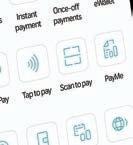

FNB data reveals a continued surge in virtual card usage, with more than R100 billion in spend since the bank launched the digital payments solution in October 2020. Notably, R50 billion of this is attributed to transactions made between January and December 2024 alone. Moreover, the bank notes its highest year on year (YOY) growth in in-store virtual card spend at 108.2% percent as at end-December 2024.





Furthermore, since the launch of the FNB Virtual card, the bank reports 5.3 million active virtual cards. The overall number of individual customers using virtual cards has increased by 40.4% YOY, with those using virtual cards for in-store purchases going up by nearly 50% YOY (49.5%) and those using their virtual cards for online purchases increasing by 39% YOY.

“The distinct differentiators of world-class security and convenience make FNB’s Virtual Card a preferable transactional method for customers, and we’re delighted to see a continued drive to what we believe to be the growing future of payments globally. When we launched the FNB Virtual card and expanded our digital payments ecosystem, we understood that it forms an important part of our journey in making the customer’s payment experience as convenient, safe, and secure as possible,” says FNB Credit Card and Card Platform CEO, Senzo Nsibande. “We’re confident that the success of this offering means that our customers know that they can trust us and our platform as they conveniently transact both in-store and online,” he adds.
“The distinct differentiators of world-class security and convenience make FNB’s Virtual Card a preferable transactional method for customers, and we’re delighted to see a continued drive to what we believe to be the growing future of payments globally. When we launched the FNB Virtual card and expanded our digital payments ecosystem, we understood that it forms an important part of our journey in making the customer’s payment experience as convenient, safe, and secure as possible,” says FNB Credit Card and Card Platform CEO, Senzo Nsibande. “We’re confident that the success of this offering means that our customers know that they can trust us and our platform as they conveniently transact both in-store and online,” he adds.
The added value of FNB’s virtual cards is that they come with a dynamic card verification value (CVV) security code which changes every hour. Customers can also temporarily block, cancel or replace their FNB or RMB Private Bank virtual cards via their Banking Apps as soon as they suspect any kind of fraudulent activity.
The added value of FNB’s virtual cards is that they come with a dynamic card verification value (CVV) security code which changes every hour. Customers can also temporarily block, cancel or replace their FNB or RMB Private Bank virtual cards via their Banking Apps as soon as they suspect any kind of fraudulent activity.
“In an environment with constantly evolving threats, it’s imperative that we protect our customers and ensure safeguards that allow them to always transact securely. Our virtual card is central to this promise,” continues Nsibande.
“In an environment with constantly evolving threats, it’s imperative that we protect our customers and ensure safeguards that allow them to always transact securely. Our virtual card is central to this promise,” continues Nsibande.
FNB’s data also provides insight into how much FNB customers are spending, showing that virtual card transaction values increased by 5.2% in-store in 2024 compared to the year before.
FNB’s data also provides insight into how much FNB customers are spending, showing that virtual card transaction values increased by 5.2% in-store in 2024 compared to the year before.
Regarding the product and merchant categories are most important to customers - data reveals that most customers use their virtual cards on groceries, eating out, general retail, fuel, plus travel and holidays. Data furthermore reveals that for in-store purchases, grocers and fuel stations process the bulk of transactions while general retail, food delivery and travel e-commerce broaden the view.
Regarding the product and merchant categories are most important to customers - data reveals that most customers use their virtual cards on groceries, eating out, general retail, fuel, plus travel and holidays. Data furthermore reveals that for in-store purchases, grocers and fuel stations process the bulk of transactions while general retail, food delivery and travel e-commerce broaden the view.
These insights, according to Nsibande, paint a positive and promising picture for the usefulness of virtual cards among FNB’s customer base.
These insights, according to Nsibande, paint a positive and promising picture for the usefulness of virtual cards among FNB’s customer base.
“The rapid growth and adoption of our virtual card offering is encouraging and reassures us that we are on the right track as we continually endeavour to make the lives of our customers easier while innovating to ensure that their transactional environment remains safe and secure. We remain committed to providing a range of unique and inventive solutions that are centred around our customers’ needs and providing true value and help.” concludes Nsibande. A division of FirstRand Bank Limited. An Authorised Financial Services and Credit Provider (NCRCP20).
“The rapid growth and adoption of our virtual card offering is encouraging and reassures us that we are on the right track as we continually endeavour to make the lives of our customers easier while innovating to ensure that their transactional environment remains safe and secure. We remain committed to providing a range of unique and inventive solutions that are centred around our customers’ needs and providing true value and help.” concludes Nsibande.












Demand for instant payments is driving a major rethink of South Africa’s digital payments landscape, writes RUFAIDA HAMILTON, Standard Bank’s head of payments in South Africa
South Africa’s digital payments landscape is undergoing a seismic


“digital” really means and how “instant” using smart
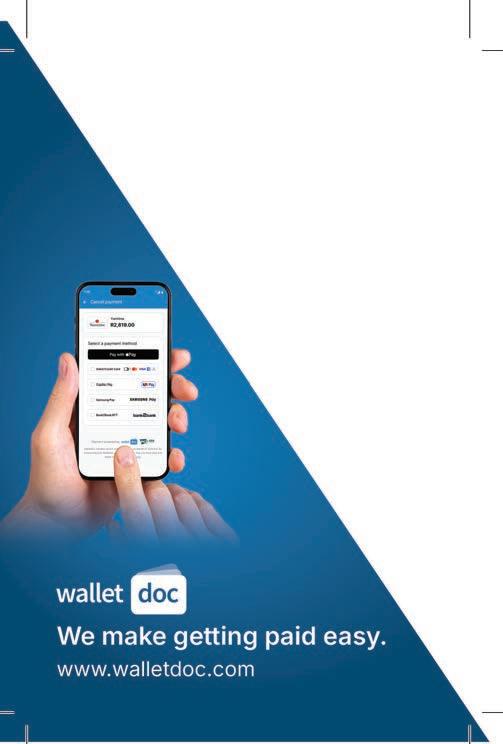
Each of these channels plays a distinct and vital role in today’s payment ecosystem. Real-time clearing has transformed EFTs into instant transfers across banks that settle in sub-ten seconds. USSD remains a lifeline for clients without smartphones. Internet banking offers full account management. QR-code scans deliver instant, contactless settlement at every level of retail. Mobile banking apps and virtual wallets offer immense convenience – from transfers to in-app bill payments and tap-to-pay.
This holistic approach has helped banks identify friction points, invest in the channels people prefer and target areas for improvement. It also con rmed that enhancing instant payments technology is the way to go to build a truly digital economy.
Although South Africa adopted real-time clearing in 2006, it was only with the launch of PayShap –introducing sub-ten-second transactions that lowered instant electronic payment fees – that digital usage truly accelerated. This modernised technology delivers faster processing, enabling better fees to clients compared to other payment options. Its 24/7, year-round availability has created ideal conditions for instant payments to prove they can match the speed of cash, without the same risks.





The impact has been dramatic: over the past year, Standard Bank Personal and Private Banking recorded a 21 per cent increase in digital payments made by its
OVER THE PAST YEAR, STANDARD BANK PERSONAL AND PRIVATE
RECORDED A 21 PER CENT INCREASE IN DIGITAL PAYMENTS MADE BY ITS CLIENTS IN SOUTH AFRICA IN THE PAST YEAR, WHILE REAL-TIME CLEARING VOLUMES LEAPT BY MORE THAN 40 PER CENT YEAR-ON-YEAR.





Digital payments cover every electronic channel available to the end user: traditional EFTs, cellphone payments via USSD, internet banking through desktop browsers, mobile banking apps, QR-code scans and virtual and cardless payments using smart devices.
clients in South Africa in the past year, while real-time clearing volumes leapt by more than 40 per cent year-on-year.
Yet even these impressive gains pale in comparison to the momentum behind PayShap, the mobile- rst overlay that replaced cumbersome account numbers with a simple phone number.
Since its launch in 2023, PayShap adoption among Standard Bank clients has risen tenfold, demonstrating a clear truth: immediacy matters, but simplicity is the catalyst for mass uptake. By removing the friction of bene ciary details, PayShap has become the game-changer that will guide where we invest our next wave of innovation.
So, who is driving this transformation? Middle-aged professionals in the 36–45 age bracket account for the highest volume of digital transactions, re ecting both purchasing power and digital uency. Yet the fastest growth is among 16 to 25 year olds (our Generation Z), whose appetite for mobile- rst solutions signals the dawn of a new generation of digitally native consumers.
Regionally, Gauteng leads the charge, responsible for 38 per cent of all digital payment activity, followed by the Western Cape (18 per cent) and KwaZulu-Natal (17 per cent). Provinces with lower activity present fertile ground for partnerships that can bolster connectivity, nancial literacy and infrastructure, ensuring the bene ts of instant payments reach every corner of the country.
The infrastructure and core technologies behind instant payments are vital to enabling 24/7 payments. PayShap alone has seen major investment in cloud-based systems and advanced data-rich messaging standards, aligning us with global peers and supporting usage growth. Sustained investments in these technologies boost reliability, build client trust and encourage wider digital payment adoption. With rapid tech advancements, including agentic arti cial intelligence, we’re also strengthening fraud detection and cybersecurity through real-time monitoring, behavioural analytics and tokenisation to protect our clients.
Follow: Rufaida Hamilton @ www.linkedin.com/in/rufaida-banoobhai
We leverage these tools to enhance digital experiences and mitigate fraud, driving the shift from cash to digital. As smartphone usage grows in South Africa, we’ve seen a decline in USSD payments. While USSD has been essential, increased smartphone access, affordable data and improved digital literacy are shifting usage to apps and online platforms. Still, it’s vital to maintain inclusive, secure options for unbanked or less digitally connected users to avoid widening the digital divide.
Looking ahead, current trends show that the payments industry must think beyond merely processing transactions. Real-time data is painting a clearer picture of where to channel our energies: simplifying our processes to promote nancial inclusion. By tearing down the barriers between payer and payee, whether via USSD for the unbanked or PayShap for early adopters, we embrace a future where every transaction is instant, intuitive and within everyone’s reach.
WHAT BEGAN AS A GRADUAL MIGRATION FROM CASH AND CARDS HAS BECOME



The Association of South African Payment Providers champions fair access, innovation and reduced costs – driving digital payment adoption in a country still heavily reliant on cash. By
MEGAN ELLIS
In a move aimed at transforming the local payments landscape, eight nonbank ntech entities worked together to form The Association of South African Payment Providers (ASAPP). Many of its objectives align with the South African Reserve Bank’s (SARB) Vision 2025 goals, including transforming the payments ecosystem and moving away from our reliance on cash. But how exactly does ASAPP plan to achieve its vision and why did its members decide that collaboration between different companies is the best way to do this?
In early 2024, eight ntech companies came together to create ASAPP. The founding members include Altron Fintech, Hello Group,
is well-positioned to advocate for equitable access to payment infrastructure, reduced wholesale fees and enhanced transparency –all essential components for modernising the payments ecosystem and promoting nancial inclusion.
“The formation of ASAPP re ects a growing consensus within the nonbank sector on the need for a collective voice to eliminate structural barriers and facilitate the integration of the unbanked population into the digital economy.”
According to the South African Reserve Bank’s Payments Study Report for 2023, the Diary of Consumer Payment Choice survey found that 98 per cent of consumers use cash as a payment method. However, the average value of these values was lower than the overall value of payments across all payment methods.
Source: South African Reserve Bank
able to use what you have as a store of value to access goods and services. If you don’t have a bank card, why should that hold you back from accessing the services you need? That is the type of bene t that this alliance hopes to bring to the fore.”


Mali notes that since the local economy relies on cash to a signi cant degree, millions of consumers as well as small and medium businesses are underserved by the traditional banking sector. At the same time, however, a range of challenges inhibit the growth of alternative payment methods like digital payments. “Within this environment, e-commerce and ntech innovators encounter several critical challenges, including slow settlement times, high transaction costs and restricted access to national payment systems.”
Asked why his company joined ASAPP, Rahul Jain, CEO and co-founder of Peach Payments, says its aims align with Peach Payment’s own business goals. “ASAPP’s aims – to provide fair access to payment infrastructure, reduce the wholesale cost of digital payments and enhance transparency and customer mobility – are all key to our business in the long term.
“The idea of nancial inclusion goes beyond simply having a bank account. It is about being
So why would competitors come together to form an association, rather than aiming to accomplish their goals alone? According to Mali and Jain, collaboration – even in a competitive environment – comes with numerous bene ts.
Jain says the partnership can accelerate the transformation each company aims to achieve. “The collective body can lobby for regulation
“THE FORMATION OF ASAPP REFLECTS A GROWING CONSENSUS WITHIN THE NONBANK SECTOR ON THE NEED FOR A COLLECTIVE VOICE TO ELIMINATE STRUCTURAL BARRIERS AND FACILITATE THE INTEGRATION OF THE UNBANKED POPULATION INTO THE DIGITAL ECONOMY.” – LINCOLN MALI





SARB’s National Payment System Framework and Strategy: Vision 2025





that fast-tracks South Africa’s adoption of digital payments, which reduces the cost of cash that the country still faces.
“ASAPP is also perfectly positioned to contribute to SARB’s stated intention to review interchange and its associated fees, which is an area we believe will help to reduce costs.”
Mali says the companies that comprise ASAPP are united by a shared vision that can be more effectively achieved if they work together.
“Over the past few months, it has been truly remarkable to witness the depth of collaboration and ongoing dialogue among leaders who are typically erce competitors. Positioning themselves as a collective force for change, members aimed to complement the broader nancial ecosystem. By pooling their resources, insights and in uence, they established a strong foundation for industrywide advocacy and collaborative progress.”
The collaboration also provides a way to ensure nonbanking entities can in uence








SARB’s Digital Payments Roadmap: towards inclusive, accessible, effective and sustainable digital payments in South Africa
“THE COLLECTIVE BODY CAN LOBBY FOR REGULATION THAT FAST-TRACKS SOUTH AFRICA’S ADOPTION OF DIGITAL PAYMENTS, WHICH REDUCES THE COST OF CASH THAT THE COUNTRY STILL FACES.”
– RAHUL JAIN
systemic change in South Africa’s nancial regulatory framework, explains Mali. “The South African payments landscape is governed by complex regulatory frameworks and has historically been dominated by traditional banking institutions. While individual ntech companies have demonstrated agility and innovation, their ability to in uence systemic change has been constrained by limited representation in national forums and policy development processes.”
Mali says by operating through a uni ed industry association, members are able to amplify their collective voice and share resources and expertise. “Through ASAPP, nonbank providers can participate in initiatives such as PayShap and the public utility model, from which they might otherwise be excluded.”
The association helps mitigate shared risks for members. “ASAPP enables its members to anticipate, assess and respond collectively to regulatory developments and market shifts,”
The South African Reserve Bank’s Payments Study Report for 2023 also found that only 33 per cent of the population has no difficulty adopting electronic or digital financial methods. However, 31 per cent of the population has no interaction with technology platforms or digital payment methods due to structural or financial barriers that reduce access.
Source: South African Reserve Bank
Follow: Lincoln Mali @ www.linkedin.com/in/lincoln-mali-34666233
Rahul Jain @ www.linkedin.com/in/rahuljain19
In 2024, the South African Reserve Bank (SARB) published its Digital Payments Roadmap, which was designed to realise the goals of the National Payment System Framework and Strategy: Vision 2025. This vision aims to promote competition and innovation, cost-effectiveness, interoperability and financial inclusion.
However, despite the launch of PayShap in March 2023 and more widespread availability of contactless payments and QR code payments, SARB said in its roadmap that the adoption of new digital payment channels has been slow. Hindrances to adoption include over-reliance on cash, high costs to consumers and small businesses, fragmented systems, barriers to access for underserved and disadvantaged communities, a lack of access to infrastructure and distrust of digital payments.
Source: South African Reserve Bank
says Mali. “In essence, it serves as a strategic platform that strengthens the impact of its members, enabling a more co-ordinated and effective contribution to the transformation of South Africa’s payments ecosystem.”
SARB has already shown a willingness to allow more exibility for digital payments providers that are hampered by certain regulations. The bank published its draft “Directive in respect of speci c payment activities within the national payment system” in March 2025, which included an exemption list that would reduce the need for nonbank payment companies to partner with banks to facilitate certain transactions. While the payments landscape is undergoing signi cant change in South Africa, with transformation at the forefront for stakeholders, ASAPP is ensuring that nonbank ntech companies have a seat at the table.
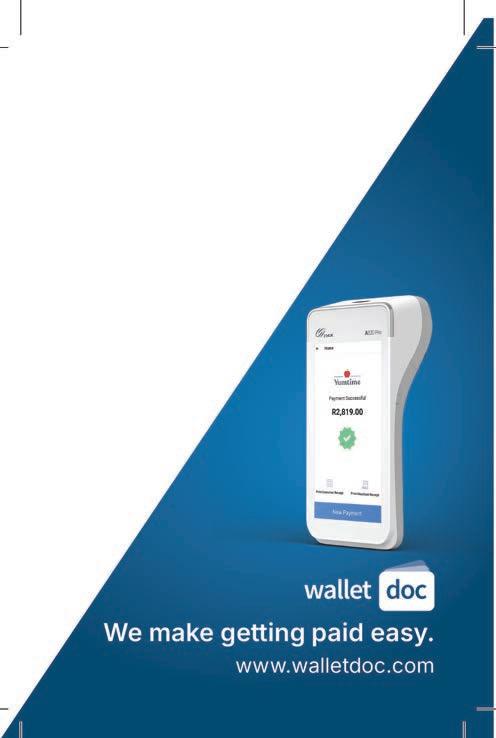


Swallet. It now includes a wider range of features that go beyond payments, helping users manage everything from digital IDs to car keys – all within a single app.
• Payments – online and offline: make quick, contactless payments in-store or check out easily online using Samsung Pay. Samsung Wallet supports over 13 major South
payment gateways. It’s even compatible with securely store passwords fast, safe auto ll when logging into apps
models from a handful of brands, users can lock, unlock and start their vehicles right from their phone.
• Boarding passes: users can save digital boarding passes from various airlines, keeping their passes within easy reach, streamlining airport travel.
• Loyalty cards, coupons and tickets: you can store and access loyalty cards, event tickets, vouchers and coupons with just a tap, making it easier to save and redeem on the go.
• Digital ID and digital assets (coming soon): Samsung Wallet plans to support secure storage of digital IDs, such as driver’s licences and national ID cards. It will also introduce features for digital asset management, offering future-ready nancial tools.
Samsung Wallet is secured by Samsung Knox, the company’s powerful mobile security platform. It ensures your data is protected through encryption, ngerprint authentication and a secure environment isolated from other apps. This protects against threats like malware and unauthorised access.
Samsung Wallet is available on most near- eld communication-enabled Samsung smartphones, from the Galaxy A Series to agship models. With a simple swipe, tap or side-key press, users can instantly access their wallet and enjoy a smarter, more secure digital experience.
By consolidating your physical wallet into a secure mobile solution, Samsung Wallet enhances daily convenience – whether you’re paying at a store, boarding a ight, unlocking your car or managing digital credentials. It’s a smarter, safer way to carry what matters.


For more information: www.samsung.com/za
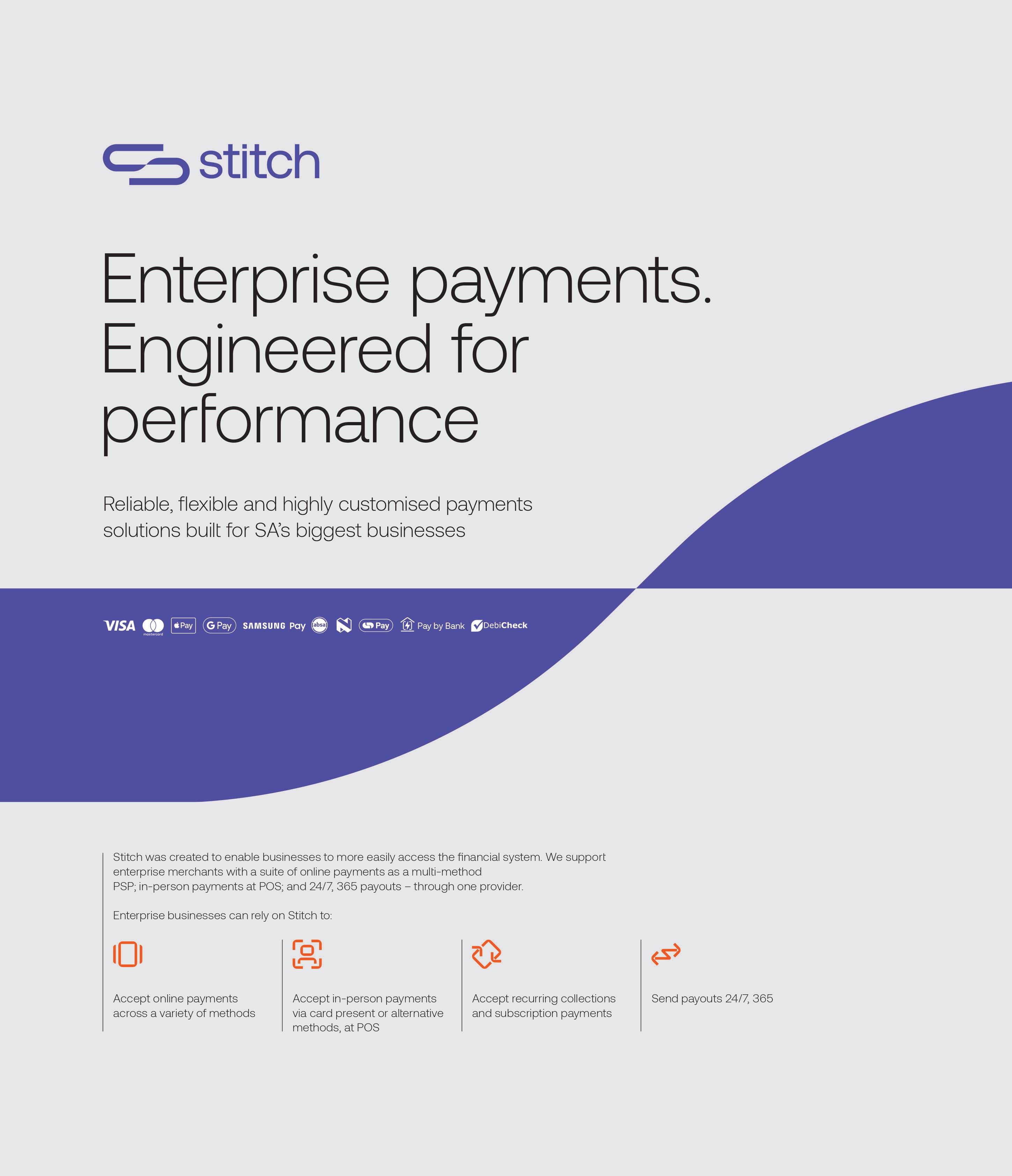

South Africa’s payments ecosystem has been evolving rapidly with significant growth over the past few years and open banking continuing to take centre stage, writes THEA SOKOLOWSKI , head of marketing and communications at Stitch
Capitec Pay was the rst bank application programming interface (API) to enter the market, launching in 2023. Since then, this method has seen massive growth and other bank APIs, including Absa Pay and Nedbank Direct EFT, have followed.
PayShap launched in 2023 on South Africa’s Rapid Payments Programme – or instant payment rails – with its latest iteration, PayShap Request, currently being rolled out. This is poised to make it even easier, safer and more ef cient for customers to make payments directly from their bank accounts.
Fintech innovators, such as Stitch, are developing new, more ef cient solutions that enable businesses to leverage the latest technology emerging from the online banking space while providing increasingly seamless payment journeys for their customers.
Across industries, we see innovation from a customer experience, security and payments perspective.
Consumers increasingly demand faster, more seamless and more personalised experiences when shopping or paying online. This is re ected in the new payment methods and options being launched, including PayShap Request.
It also extends to withdrawals, refunds and claims payouts. A recent consumer survey in the insurance space found that 56 per cent of consumers, for example, would be in uenced to choose an insurance provider based on how easy it is to receive payment after a claim.
In the gaming space, 78 per cent of surveyed punters indicated that fast and easy withdrawals would in uence where they choose to place their bets – with fast processing times as the number one indicator of a positive withdrawal experience.
Today, the businesses that will win are the ones that will be able to offer fast, reliable and seamless payments – and payouts.
Digital wallets – including Apple Pay, Google Pay and Samsung Pay – are growing rapidly in South Africa. Tap-to-pay technology makes it easier to get moving when paying in person and one-click digital payments enable a smoother checkout.

Many of South Africa’s largest banks recorded a big surge in digital wallet usage in the rst half of 2024, with Apple Pay being the most popular method.
Some e-commerce clients using Stitch for payments found that upwards of 25 per cent of online card transactions moved over to Apple Pay upon launch, with over 30 per cent moving within two months.
One of the standout trends is the growing opportunity in omnichannel retail, where brands such as The Foschini Group’s Bash and Yuppiechef are changing the game when it comes to creating a uni ed and personalised experience for their customers, no matter where they choose to shop.
These brands have made signi cant inroads in streamlining the shopping experience for their customers. In line with a true omnichannel experience, they offer customers the ability to, for example, purchase items in-store and at point of sale and order additional items for delivery in the same transaction. The customer’s previous shopping history and payment preferences can be saved, allowing


for a better overall shopping experience, often leading to a bigger basket size.
There is also ongoing demand for more human interaction and customer support, leading to a surge in chat and conversational commerce.
Customers are looking to engage with real humans via chat – and on social media – for support with purchasing. Breaking that ow by forcing them to initiate a payment elsewhere can result in a drop-off. In these cases, the ability to send custom payment links in chat is a game-changer – ensuring the transaction is completed and the customer is satis ed.
As the market shifts towards open banking, the pay-by-bank/bank-to-bank payments space is beginning to resemble card payments more closely, meaning greater convenience and security for users and a more standardised offering for merchants across banks.
With the demand for instant, digital payments increasing, traditional payment methods face competition. Request-to-pay options enable a better user experience, faster settlement, lower costs and better fraud prevention than traditional methods.
CONSUMERS INCREASINGLY DEMAND FASTER, MORE SEAMLESS AND MORE
PERSONALISED EXPERIENCES WHEN SHOPPING OR PAYING ONLINE.
Follow: Thea Sokolowski www.linkedin.com/in/thea-sokolowski/
South Africa’s payments landscape is transforming fast. With PayShap gaining traction, banks and businesses must modernise systems or risk falling behind in the digital economy, writes Electrum’s DAVE GLASS
South Africa is on the brink of a major shift in how payments are made, aligned with global modernisation programmes. India’s UPI and Brazil’s Pix prove that when digital payments are easy, fast and cheap, transaction volumes increase. Locally, PayShap is gaining momentum and with new features such as PayShap Request and demand for digital options, we can expect a similar boom in usage.
This means it’s time for banks and businesses to prepare. When transaction volumes grow rapidly, outdated systems will not be able to keep up. Future- t payment systems need to have the speed and exibility to manage real-time, high-volume payments.
Four trends are pushing banks and retailers to modernise, not just to keep up, but also to create a competitive advantage.
Regulation is more than compliance; it’s about unlocking opportunity. New regulations are opening the door to more competition, encouraging innovation and making payments safer and more accessible, allowing nonbank participants to enter the market with innovative solutions. Banks innovating on outdated systems risk falling behind.
Today’s consumers expect fast, convenient, mobile-friendly services. If their needs aren’t met, they won’t hesitate to turn to newer, more agile providers. The pressure is on to deliver seamless digital experiences or risk losing relevance.
Arti cial intelligence (AI) is already transforming banking and payments. From automation and fraud detection to personalised customer experiences, AI’s potential is huge. Many older systems weren’t built with AI in mind. Integrating these technologies can be
complex and costly, requiring not just new infrastructure, but also clean, accessible data, something many businesses still lack.
Siloed product offerings no longer serve consumer needs as payments are expected to be embedded, seamless and integrated. Businesses that have shifted from payments-as-a-product to payments-as-a-platform stand out, and those with complex legacy architecture nd this shift dif cult to navigate.
Modernisation brings speed and agility, reduced complexity and scalability to services. This becomes the superpower for agile and innovative businesses that strive to handle increased transaction volumes, gain market share and provide competitive solutions to their customers.
The businesses that invest in agile, future-ready systems will be the ones best placed to grow, adapt and deliver standout customer experiences in a rapidly evolving payments landscape and lead the future of payments in South Africa.
The attributes of next-generation software
Applications designed for the future of paymentsovercoming the limitations of legacy platforms.

Built for the cloud
Specifically cloud-first, not just shifted.
Proven by the big techs that designed and use it.






Handles high volumes with ease.
Supports multiple regions and business needs.

Flexible services that adapt to changes. future-fit














Continuous speed and reliability improvements.

Designed to be AI ready.











Scalable, real-time processing across systems.
Electrum is the expert in next-generation payments software, delivering cutting-edge solutions that meet the unique payments needs of leading banks and retailers.
Follow: Electrum @ www.linkedin.com/company/electrum-software Dave Glass @ www.linkedin.com/in/daveglass




www.electrum.co.za



As the gig economy booms, organisations need to cut red tape and speed up payment processes to match the speed at which their suppliers deliver, writes TREVOR CRIGHTON
The term “gig economy” was born from the move away from typical nine-to- ve jobs, with people opting for freelance, exible, on-demand work to replace or supplement their income. Gig economy workers are compensated per task, tend to have many different clients simultaneously and often use online platforms to connect with clients.
The World Bank estimates that 2.4 million South Africans are self-employed – a market estimated to grow by 10 per cent per year. Statistics South Africa’s Q1:2025 Labour Market statistics report the of cial unemployment rate as 32.9 per cent and the labour force participation rate, the percentage of the population that is either employed or actively seeking employment, at 60.0 per cent. That leaves more than 8.2 million of the country’s estimated 60.2 million population without
regular work. The potential for increased volumes of people entering the gig economy is thus exponential.
The gig economy relies primarily on digital platforms to connect freelancers with customers and manage payments. In South Africa, digital payment adoption is slowly on the rise, but payment gateways and dedicated apps are helping gig economy participants on both sides make and receive payments more easily.
Bloo Money is a ntech app designed for small to medium enterprises (SMEs) that do not have dedicated payment teams to help them simplify internal invoicing and payment processes. The solution is tailored for SMEs in the services industry that receive
TEAMS TO HELP THEM SIMPLIFY INTERNAL
Statistics South Africa’s 2023 Survey of Employers and the Self-Employed to collect information on businesses not registered for value-added tax (VAT) showed that 1.9 million South Africans were running nonVAT registered businesses, up from 1.5 million a decade earlier.
Source: Statistics South Africa
funding from clients or organisations to implement projects where they work with multiple freelancers, gig workers and suppliers.
Bloo Money CEO Thulani Masebenza co-founded the company with Sabica Pardesi in 2022 after experiencing the chaos of nancial admin and late payments rst-hand as a nonpro t director and freelance artist, respectively.

Thulani Masebenza
“We both realised the same thing: invoicing with freelancers and suppliers is layered, with late payments, messy invoice trails and the chaos of nancial admin,” explains Masebenza.
Martin Schmidt, co-founder and managing director of JobLeads, told ITWeb that software development and tech dominate the South African freelance landscape, accounting for 44.09 per cent of online gig workers within the country. Creative and multimedia roles follow at 19.29 per cent and clerical and data entry jobs make up 12.14 per cent, with sales and marketing at 11.34 per cent.
“Initially, we wanted to solve this for freelancers, but as we dug deeper, speaking to more than 100 SMEs and running pilots, we saw the real issue was on the business side.”
Masebenza believes most SMEs genuinely want to pay on time, but they’re drowning in spreadsheets, back-and-forth emails, approvals from teams and manual banking.
“As we researched the market, we also found that around ninety per cent of South African SMEs are owed money beyond their payment terms at any given time in the year, while business owners, nance managers and procurement teams spend an average of two hundred and two days a year on nancial admin and supplier compliance, with processing payments taking up more than forty per cent of this time.”
He says that by improving transparency, building secure databases of freelancer details and implementing sound processes, collaboration between clients and suppliers has resulted in 98 per cent of invoices processed through the platform being paid on time. “We have not experienced any nonpayments from SMEs using our app. However, in the long term, we do plan to introduce a feature for freelance suppliers to get their payments early.”
Bloo Money’s tech currently focuses on SMEs, so it mainly facilitates secure bank-to-bank transfers, enabling SMEs to bulk pay freelancers using integrations.
“For the next phase of payments, we aim to empower freelancers with payment links so they can be paid from their clients who aren’t using Bloo Money,” says Masebenza. “Eventually we want to introduce virtual wallets and cards for teams to make simpler payments, and help them manage budgets on projects with freelancers more easily.”
Masebenza says the next steps to facilitate easier payments for freelancers include updates to features such as bank transfer and compliance. “We plan on offering veri cation for businesses that will allow them to verify freelancers’ IDs, banking details and tax personal identi cation numbers as businesses carry the risk if freelancers avoid tax.
“This will also simplify reporting for businesses to track all payments per project, payments due and enjoy automated tax deductions.”
Peach Payments aims to provide ways for merchants (individuals or organisations) to accept and make digital payments, irrespective of the industry in which they operate.
“One way we do this is to make it possible for merchants to offer their clients several safe, modern payment options, using our gateway technology,” explains CEO and co-founder Rahul Jain. “It means a smaller business doesn’t need a huge technical team to integrate the latest payment options.”
Jain says digital payments aren’t just important for retailers wanting to pay suppliers. “Services businesses like SweepSouth, for instance, also need payout options. These have become a fairly standard function of payment gateways.”
The company has an interest in building the South African digital payments landscape to facilitate easier payment processing for all. “As a whole, Africa’s payment environment is still developing, but at a tremendous rate,” says Jain. “We believe instant payments, such as PayShap in South Africa, PesaLink in Kenya, the Pan-African Payment and Settlement System and MauCas in Mauritius, will continue to grow in popularity.
“The recent launch of the Association of South African Payment Providers is also important as it will help open up existing infrastructure for both underbanked
As the gig economy in South Africa expands, five emerging trends are poised to influence its future trajectory:
• Automation will amplify.
• More organisations will use gig workers.
• Stigmas will fall away.
• Regulations will catch up.
• Online markets will transform.
Source: South African Cultural Observatory
individuals and nonbank payment providers in South Africa’s national payments system. We believe that will result in reduced fees for accepting and making payments.”
One of the greatest payment management challenges lies in facilitating secure transactions and complying with legislation across various jurisdictions. “Security and regulatory compliance are non-negotiables in this eld,” says Jain. “Peach Payments uses more than a hundred different tools and processes to ensure everything is as secure, safe and reliable for merchants and their customers as possible. Of particular note are mandatory 3D Secure authentication, continuous transaction monitoring and ongoing risk assessment and detection of suspicious activities.”
Looking to the future, Jain says Peach Payments is on a journey to build a truly pan-African payment ecosystem. “Our recent acquisition of PayDunya expanded our footprint into the West African Economic and Monetary Union and the Economic and Monetary Community of Central Africa, unlocking new opportunities for merchants who can now access over four hundred and fty million people across eleven countries. We intend to expand this coverage rapidly, and are in continued negotiations with various players to expand our footprint in Africa.”
ADOPTION IS SLOWLY ON THE RISE, BUT PAYMENT GATEWAYS AND DEDICATED APPS ARE HELPING GIG ECONOMY PARTICIPANTS ON BOTH SIDES MAKE AND RECEIVE PAYMENTS MORE EASILY.
Follow: Thulani Masebenza @ www.linkedin.com/in/thulanimasebenza Rahul Jain @ www.linkedin.com/in/rahuljain19

Earned wage access allows workers to access a portion of their earned income before payday. What does this mean for spending habits, financial inclusion and savings? By
ANTHONY SHARPE
Ah, payday. We all know the feeling of counting down to that moment when we hear the sound of precious pennies tinkling down the chutes of capitalism into our wallets, clearing away the cobwebs that tend to accrue towards the end of the month. Managing money is hard, especially for South Africans, who collectively have some of the worst saving habits on earth.


That means people often run out of money to pay for immediate needs like food, electricity, transport and airtime. October 2024 data from the National Credit Regulator showed that short-term loans, which typically carry higher interest rates, had increased by a whopping 32 per cent year-on-year, a clear sign that South Africans are struggling to cover their needs between pay cheques.

So, what if you could get paid sooner, accessing some of your accrued earnings before the end of the payroll cycle? That’s the logic behind earned wage access (EWA), which is seen by many as a more ethical alternative to payday lenders as it typically charges a small, xed fee instead of interest. Additionally, EWA transactions do not involve recourse, credit consequences or underwriting.
Digital technologies and automated payroll systems paved the way for the introduction of EWA platforms in the United States in the early 2010s. Now it’s making its mark on local shores. So how exactly does it work and, more importantly, does it work for our particular economic circumstances?
You may remember Bryan Habana for his uncanny ability to slice through rugby defences like a hot knife through butter. These days he’s busier slicing through payment friction as the chief client of cer at Paymenow, South Africa’s largest EWA and nancial wellness provider, with a user base of around 500 000 employees across 300 corporate clients, including major retailers like Shoprite, Pick n Pay and PEP.




“EWA effectively facilitates nancial empowerment while simplifying a payroll process,” explains Habana. “Paymenow embeds our platform into a company’s payroll system to give employees access to a portion of already accrued wages – we nd this, typically, to be twenty to twenty- ve per cent.”
Habana says Paymenow’s data shows that even though employees can access 20 or 25 per cent of their earned wages, they usually only use 12–16 per cent. “There’s this avoidance of the payday millionaire syndrome because they realise it will come off their salary at the end of the month. Crucially, we’re not giving people access to money they don’t have; we’re only giving them access to money for which they’ve already worked. It’s not a loan and there’s no rollover debt.



North America currently dominates the global EWA market, but Asia-Pacific is growing at the fastest rate, with a 27 per cent compound aggregate growth rate, largely driven by large gig workforces, rising smartphone penetration and employer financial wellness programmes.
Source: Data Intelo
“They can cash these earnings out into the bank account into which their salary is paid, or use our platform to buy zero-rate vouchers, such as airtime, data or electricity, or potentially invest it in a unit trust.” Cashing out wages incurs a service fee along with a transaction fee to transfer the funds to the account.
“What began as a tool to close a gap in nancial services has evolved into a holistic nancial wellness platform,” Habana says.
“Our users have completed over 1.7 million nancial education modules, re ecting strong demand for not just access, but also education and empowerment.”
Habana says Paymenow is leveraging EWA as a tool for nancial inclusion.
“We’ve incorporated an
“PAYMENOW EMBEDS OUR PLATFORM INTO A COMPANY’S PAYROLL SYSTEM TO GIVE EMPLOYEES ACCESS TO A PORTION OF ALREADY ACCRUED WAGES



Allan Gray Money Market account into the platform, which allows employees to save as little as R50. This means we can give those who are most nancially excluded the opportunity to access a pretty nancially exclusive product.” Since February 2023, Paymenow users have saved nearly R4.6-million using the savings feature.

A study by J P Morgan, “Empowering financial inclusion through payments”, compared the Consumer Profile Bureau credit scores of around 30 000 people not using EWA to those of 10 000 Paymenow users. It found that while the former saw a drop in credit score of 3–9.5 per cent, depending on their age, the latter saw an improvement of 0.6–13.4 per cent.
Typically, opening such an account requires a combination of a minimum monthly debit order of R1 000 and a minimum initial lump sum investment of R2 500, or a minimum lump sum of R50 000. “Through our bulk customer base, we can provide access to this R50 with a healthy return.”
Paymenow participated in a study with customer insights company 60 Decibels to understand what sort of an impact its service was having on people. It was found that 75 per cent reported an increase in savings, almost 70 per cent had less debt and 90 per cent felt their overall quality of life had improved.
So, what is the incentive for employers to get on board? “Employers have reported a reduction in absenteeism and a more engaged workforce,” says Habana. “Offering EWA can help improve the employer-employee relationship.”
Savings also form part of the core philosophy behind Floatpays, which offers EWA along with a range of other employee bene ts. “We’re trying to move EWA into a savings culture,” says founder and CEO Simon Ward “We believe the real issue lies in employees turning to high-interest loans or loan sharks during emergencies. Our solution offers a
complete nancial wellness package that includes a responsible alternative to payday lenders via EWA and essential vouchers for data, airtime, electricity, food and medical needs that can be obtained via EWA purchases. Employees also get access to debt support and consolidation where appropriate and, most importantly, our very own regulated savings products.”
Ward acknowledges concerns around EWA that giving people access to their money simply kicks the nancial can down the road. However, he says, the alternative is turning to loan sharks and other short-term debt channels. “This is where the crux of the problem lies, as these loan providers can charge up to fty per cent interest. Instead, we’re nancially educating people through things like wealth calculators and debt management and consolidation tools within the app to help them manage their money responsibly. This is paired with a variety of individual and group savings products.”

Having just launched a new app, Moneyclub, Floatpays is in the process of pivoting its offering to be a savings- rst platform. “Our latest innovation is a group savings club inspired by stokvels,” says Ward. “It enables people to save in groups, in an audited, controlled, secure and user-friendly manner.” Floatpay’s data, says Ward, shows that 77 per cent of users have, for the rst time, started saving or increased their savings. “We’ve also seen a reported ninety-six per cent reduction in nancial stress for employees, while seventy-six per cent of employers have reported an increase in staff happiness.”
This reduction in stress has obvious bene ts for employers, including a 28 per cent increase in employee retention. Ward says the Floatpays platform integrates seamlessly with payroll systems, with a centralised portal for managing EWA that displays controls, rules and analytics about usage patterns and the like. “This saves time for payroll and human resources, with fewer salary advance requests and less manual admin.”
Ward believes EWA is in a hyper-growth phase at the moment. “We’re seeing it become a bene t for which people are willing to move jobs.”
“OUR LATEST INNOVATION IS A GROUP SAVINGS CLUB INSPIRED BY STOKVELS. IT ENABLES PEOPLE TO SAVE IN GROUPS, IN AN AUDITED, CONTROLLED, SECURE AND USER-FRIENDLY MANNER.”
Follow: Bryan Habana @ www.linkedin.com/in/bryanhabana/ Simon Ward @ www.linkedin.com/in/wardsimon/ and make the display text www.linkedin.com/in/wardsimon






n an era of rapid digital transformation, the role of transaction switching in powering seamless and secure payment experiences has never been more critical. Altron FinTech is at the forefront of this transformation, enabling interoperability and rede ning the way payments are processed across various sectors, from banks to retailers and public-sector platforms.
With the digital world rapidly evolving, payments must be seamless, secure and instantaneous. This expectation has propelled the evolution of transaction switching, an essential element in the payment ecosystem. But what exactly is a transaction switch and how does it differ from a payment gateway or processor? Understanding these distinctions is crucial for businesses striving to create ef cient and secure payment solutions.



A transaction switch is an electronic platform designed to route payment messages between parties such as merchants, banks, payment service providers (PSPs) and government systems. It serves as the backbone of the payment ecosystem, managing transactions securely and ef ciently. Traditionally, transaction switching referred to physical terminals that accepted card payments. However, as the landscape evolved, transaction switches now process digital payment tokens while still interacting with physical environments.
In contrast, a payment gateway is primarily used in e-commerce to facilitate online transactions. Payment gateways manage “card-not-present” transactions, typically handling online payments in a more digital environment. A payment processor, while often used interchangeably with a switch, focuses more on the actual handling and execution of payment processing rather than routing messages.

Switching plays a key role in ensuring seamless interactions between various players in the payment ecosystem. A switch connects all these entities, enabling them to communicate and complete transactions safely and ef ciently.
For instance, when a customer makes a purchase at a retail store, a payment switch ensures that the merchant’s terminal communicates with the bank’s server, authorising and processing the payment in real-time. This interaction happens

Charl Janse van Rensburg




within a fraction of a second, thanks to the switch’s ability to connect multiple systems and provide the necessary messaging that facilitates secure and accurate transaction completion.
In high-volume environments like retail and public sector disbursements, uptime, speed and security are non-negotiable. Delays in payment processing can lead to frustrated customers and lost sales.
Altron FinTech’s switching infrastructure is designed to meet these demands by ensuring real-time transaction processing without compromising security. Robust, active-active architecture allows transactions to be initiated in one data centre and completed in another, ensuring continuous availability. This redundancy provides a layer of resilience, making sure that payments are processed without interruption. Security is a core component of this system, ensuring every transaction is encrypted and meets the highest standards of compliance.
This technology powers some of South Africa’s biggest payment switches. Our experience and technology enable seamless switching for banks, retailers and public sector clients. We understand the intricacies of the payment ecosystem, especially when dealing with different card payment switches, and we navigate the complexities of interoperability between multiple technologies to ensure the best results.
As the payments landscape evolves, new technologies like open banking and payment tokens are reshaping the way transactions are processed. We continually enhance our platforms to support new payment methods, such as QR payments and PayShap, and by integrating application programming interfaces (APIs) that allow these innovations to work seamlessly within the existing infrastructure.
With the rise of digital payment methods like QR payments, ISO 20022 and PayShap, transaction switching is evolving to support these new use cases. The core principle of transaction switching remains the same
Follow: Charl Janse van Rensburg @ www.linkedin.com/in/charl-van-rensburg-5543751b
– facilitating the ow of money securely and ensuring payments are reconciled correctly on both sides of the transaction.
The future of transaction switching is being shaped by smart switching, arti cial intelligence-driven fraud detection and cloud-native infrastructure. Smart switching, enabled by APIs and open banking, is making it easier to integrate multiple service providers into a single platform. While this opens up new possibilities, it also introduces security challenges that must be addressed through advanced fraud detection systems powered by arti cial intelligence (AI).
AI will play a key role in enhancing security and improving fraud detection, ensuring transactions are not only fast and accurate, but also safe. With the help of AI, transaction switching will become more intelligent, capable of learning and adapting to new threats in real-time.





In today’s fast-paced digital economy, seamless, secure and instant payments are not just expected; they’re essential. Powering these high-stakes moments is Altron FinTech’s advanced transaction switching platform, the backbone behind some of South Africa’s most dynamic and demanding payment environments. Whether enabling real-time disbursements for nancial service providers or driving secure, high-volume retail transactions in distributed environments, our technology is shaping how South Africa transacts, simply, safely and reliably.
At Altron FinTech, we go beyond technology. We partner with forward-thinking businesses, from national retailers to disruptive ntechs, to solve complex payment challenges. Whether our customers are looking to digitise customer disbursements, enable seamless mobile wallet payments across rural outlets or onboard merchants at scale in underbanked communities, our switching solutions make this possible.
These are not just payment transactions; they’re real-time moments of trust, empowerment and economic activity. And behind each one is our platform, engineered for reliability, scalability and interoperability.
Our platform intelligently routes payment requests between merchants, banks, payment service providers (PSPs), ntechs and regulators in real-time. It’s the orchestration engine behind every tap, scan or transfer, from card terminals in retail chains to mobile payments in informal markets.
While payment processors handle individual rails, Altron FinTech’s switch brings everything together, securely and seamlessly, across EFT, tokenised payments, QR codes and open banking application programming interfaces (APIs).
When a customer taps their card at a hardware outlet, or when funds are disbursed

via mobile wallet to thousands of recipients simultaneously, uptime and speed are critical. Altron FinTech’s active-active architecture ensures our customers never miss a transaction, even during power outages or data centre disruptions.
Our platform is trusted to process millions of transactions daily, helping organisations avoid downtime, reduce customer friction and safeguard brand trust.
Our offering is more than a transaction router. It’s a fully integrated, modular platform designed for modern nancial operations. Key capabilities include:
• Digital wallet integration and disbursement engines: ideal for businesses digitising cashbased ecosystems.
• QR payments and tokenised transactions: enabling modern, mobile- rst payment experiences.
• DebiCheck TT3 authentication and tokenisation: secure, compliant transactions with customer control.
• VAS, transfers and reconciliation services: supporting broader nancial journeys, not just payments.
• UP framework and open banking APIs: fast-track integrations across retailers, PSPs and ntechs.
• Merchant aggregation for informal retail: expand your network with secure onboarding at scale.
• Retail solutions and Android POS devices: supporting frontline agility and transaction intelligence.
• Terminal management and eld support: ensuring performance, uptime and rapid resolution.
From enabling small, medium and micro enterprises in remote areas to digitising grant disbursements and optimising high-volume retail checkouts, our platform handles it all, securely, intelligently and at scale.
We thrive in complexity. Whether integrating legacy systems for big enterprise customers, multiple card schemes, government mandates or new ntech services, Altron FinTech uni es fragmented infrastructure into a single intelligent ecosystem.
We enable:
• Cross-bank interoperability.
• Hybrid and backward-compatible solutions.
• Real-time clearing, PayShap and ISO 20022 readiness.
• Secure routing across multiple providers, rails and schemes.
At Altron FinTech, our impact goes beyond providing technology solutions; we collaborate to drive true transformation for businesses.
For example, our recent partnership with an Australian retail leader, that turned to Altron FinTech when it sought to enhance its transaction switching capabilities as it expanded into the South African market. We partnered with the company to design and implement a robust switching platform that would integrate seamlessly with local payment systems, enabling secure and ef cient transactions across its stores in South Africa. This partnership allowed the company to enhance its retail operations and offer a secure, reliable and scalable payment infrastructure to its customers in a new market. In another successful partnership, one of South Africa’s largest hardware retailers faced signi cant challenges with fraud and nancial
ALTRON FINTECH’S ACTIVE-ACTIVE ARCHITECTURE ENSURES OUR CUSTOMERS NEVER MISS A TRANSACTION, EVEN DURING POWER OUTAGES OR DATA CENTRE DISRUPTIONS.
mismanagement. With millions of rands lost due to internal theft and payment errors, it turned to Altron FinTech for a more secure and streamlined solution. We implemented a secure, tokenised card system across its stores, enabling customers to load their funds onto secure cards and shop at any of the retailer’s locations without worrying about fraud. This innovative solution helped the retailer signi cantly reduce fraud, improve operational ef ciency and increase customer trust.
These examples are just two of the many ways Altron FinTech is transforming the payment landscape in South Africa by providing robust, secure and scalable solutions for businesses.
We don’t wait for the future, we build it. Altron FinTech is already powering:
• Real-time QR and mobile payments: for contactless commerce in-store and remotely.
• PayShap-enabled infrastructure: instant account-to-account money movement.
• Open banking compatibility: ntech-friendly APIs for ecosystem collaboration.
• Arti cial intelligence-powered fraud detection: real-time alerts and anomaly agging to protect every transaction.
Security is foundational, not an afterthought. With PCI DSS compliance, military-grade encryption, arti cial intelligence fraud detection and always-on monitoring, we protect our customers and their customers with every single transaction.
Our switching environment is:
• Cloud-native for rapid, scalable deployments.
• API- rst to plug in partners and new services easily.
• Analytics-driven, offering real-time insights and decisioning.
• Customisable with industry-speci c work ows from retail to utilities.
We empower our customers to innovate faster, reduce costs and drive digital transformation with complete control and visibility.
Our solutions are built in collaboration with global hardware and software leaders and tailored for South Africa’s regulatory, market, and infrastructure realities. That’s how we deliver world-class innovation with local relevance.
We’re not just a technology vendor, we’re your transformation partner. Our role is to enable economic inclusion, scale digital ecosystems and build infrastructure that supports South Africa’s nancial future because you matter. With Altron FinTech, you gain:
• Proven, high-performance switching infrastructure.
• End-to-end support across retail, ntech and public sectors.
• Strategic guidance from a partner with decades of payment expertise.
Let’s co-create a payment landscape that’s simpler, safer and smarter for everyone. Let’s power the future of payments, together. Ready to modernise your switching environment, digitise disbursements and unlock real-time customer experiences? Altron FinTech is here to help.


